Archive for July 2013
Student forgotten in cell gets payout
- NEW: "I was screaming. I was completely insane," student tells station
- College student Daniel Chong was detained after a DEA raid at a friend's house in 2012
- He was left in a cell for five days without food or water and lost 15 pounds, attorney says
- Chong has since returned to university to earn an economics degree, attorney says
San Diego (CNN) -- A University of California San Diego student left unmonitored in a holding cell for five days by the Drug Enforcement Administration has settled a lawsuit for $4.1 million, his attorney said.
"This was a mistake of unbelievable and unimaginable proportions," attorney Julia Yoo said on Tuesday.
Daniel Chong, 25, drank his own urine to survive and even wrote a farewell note to his mother before authorities discovered him severely dehydrated after a 2012 drug raid in San Diego.
He was held in a 5-by-10-foot cell with no windows but a peephole through the door. It had thick concrete walls and was situated in a narrow hallway with four other cells, isolated from the rest of the DEA facility, said Eugene Iredale, another of Chong's attorneys.
There was no toilet, only a metal bench on which he stood in a futile attempt to set off the sprinkler system with his cuffed hands, Chong told CNN affiliate KSWB.
He kicked the door and yelled, anything to get someone's attention, the station reported.
"I was screaming. I was completely insane," he told KWSB.
One matter still unclear is why no one heard him. Chong told the San Diego Union-Tribune last year that he heard footsteps, muffled voices and the opening and closing of cell doors, even from the cell adjacent to his. Yet no one responded to the ruckus coming from inside his cell.
Chong was detained on the morning of April 21, 2012, when DEA agents raided a house they suspected was being used to distribute MDMA, commonly known as "ecstasy."
A multiagency narcotics task force, including state agents, detained nine people and seized about 18,000 ecstasy pills, marijuana, prescription medications, hallucinogenic mushrooms, several guns and thousands of rounds of ammunition from the house, according to the DEA.
It wasn't until the afternoon of Wednesday, April 25, that an agent opened the steel door to Chong's cell and found the handcuffed student, Iredale said last year.
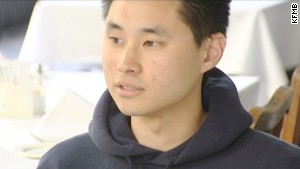 Student drank urine to survive DEA cell
Student drank urine to survive DEA cell 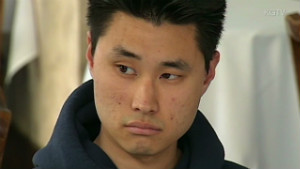 2012: Student feared death, dehydration
2012: Student feared death, dehydration Upon his release, Mr. Chong told CNN affiliate KNSD that he was visiting a friend and knew nothing about the presence of drugs and guns. He was never formally arrested or charged, the DEA said.
While detained, Chong had given up and accepted death, using a shard of glass from his glasses to carve "Sorry Mom" onto his arm as a farewell message, Yoo said. Chong lost 15 pounds and suffered from severe post-traumatic stress disorder, she said.
"He's the strongest person I have ever met," Yoo said. "As a result of his case, it's one of the primary reasons the DEA placed a nationwide policy that calls on each agent at satellite offices to check on the well-being of prisoners in their cells on a daily basis," Yoo said.
A DEA spokeswoman declined to comment extensively about the settlement and told CNN that a review of DEA procedures was conducted and submitted to the inspector general's office at the Department of Justice. She also referred CNN to a previous statement.
"I am deeply troubled by the incident that occurred here," said DEA San Diego Special Agent in Charge William R. Sherman shortly after the incident. "I extend my deepest apologies to the young man and want to express that this event is not indicative of the high standards that I hold my employees to."
Since the incident, Chong has returned to complete his undergraduate degree at UC San Diego, Yoo said. "He changed his major from engineering to economics and wants to finish school, pursue his career and help take care of his mother."
CNN's Eliott C. McLaughlin contributed to this report.
NSA secrets kill our trust
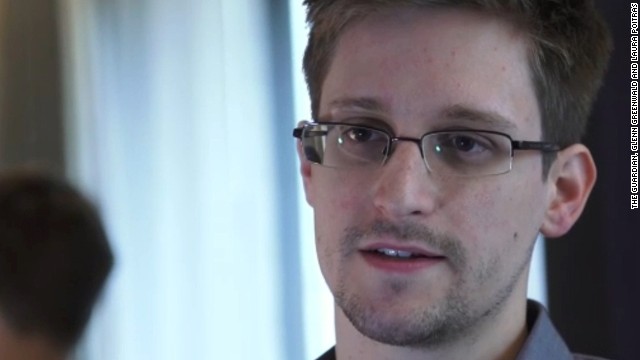
- Bruce Schneier: Government officials lied to us that the state doesn't collect our data
- Schneier: It's clear that we can't trust anything anyone says about the NSA programs
- He says corporations have gone along with government in hiding the truth from us
- Schneier: Too much secrecy has robbed people of their trust in government
Editor's note: Bruce Schneier is a security technologist and author of "Liars and Outliers: Enabling the Trust Society Needs to Survive."
(CNN) -- In July 2012, responding to allegations that the video-chat service Skype -- owned by Microsoft -- was changing its protocols to make it possible for the government to eavesdrop on users, Corporate Vice President Mark Gillett took to the company's blog to deny it.
Turns out that wasn't quite true.
Or at least he -- or the company's lawyers -- carefully crafted a statement that could be defended as true while completely deceiving the reader. You see, Skype wasn't changing its protocols to make it possible for the government to eavesdrop on users, because the government was already able to eavesdrop on users.
At a Senate hearing in March, Director of National Intelligence James Clapper assured the committee that his agency didn't collect data on hundreds of millions of Americans. He was lying, too. He later defended his lie by inventing a new definition of the word "collect," an excuse that didn't even pass the laugh test.

As Edward Snowden's documents reveal more about the NSA's activities, it's becoming clear that we can't trust anything anyone official says about these programs.
Google and Facebook insist that the NSA has no "direct access" to their servers. Of course not; the smart way for the NSA to get all the data is through sniffers.
Apple says it's never heard of PRISM. Of course not; that's the internal name of the NSA database. Companies are publishing reports purporting to show how few requests for customer-data access they've received, a meaningless number when a single Verizon request can cover all of their customers. The Guardian reported that Microsoft secretly worked with the NSA to subvert the security of Outlook, something it carefully denies. Even President Obama's justifications and denials are phrased with the intent that the listener will take his words very literally and not wonder what they really mean.
NSA Director Gen. Keith Alexander has claimed that the NSA's massive surveillance and data mining programs have helped stop more than 50 terrorist plots, 10 inside the U.S. Do you believe him? I think it depends on your definition of "helped." We're not told whether these programs were instrumental in foiling the plots or whether they just happened to be of minor help because the data was there. It also depends on your definition of "terrorist plots." An examination (PDF) of plots that that FBI claims to have foiled since 9/11 reveals that would-be terrorists have commonly been delusional, and most have been egged on by FBI undercover agents or informants.
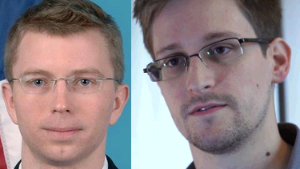 Dad to Snowden: Stay safe ... in Russia
Dad to Snowden: Stay safe ... in Russia 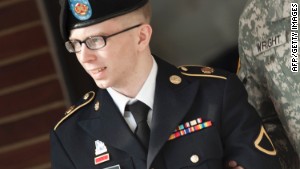 Greenwald: Manning did journalists' jobs
Greenwald: Manning did journalists' jobs Left alone, few were likely to have accomplished much of anything.
Both government agencies and corporations have cloaked themselves in so much secrecy that it's impossible to verify anything they say; revelation after revelation demonstrates that they've been lying to us regularly and tell the truth only when there's no alternative.
There's much more to come. Right now, the press has published only a tiny percentage of the documents Snowden took with him. And Snowden's files are only a tiny percentage of the number of secrets our government is keeping, awaiting the next whistle-blower.
Ronald Reagan once said "trust but verify." That works only if we can verify. In a world where everyone lies to us all the time, we have no choice but to trust blindly, and we have no reason to believe that anyone is worthy of blind trust. It's no wonder that most people are ignoring the story; it's just too much cognitive dissonance to try to cope with it.
This sort of thing can destroy our country. Trust is essential in our society. And if we can't trust either our government or the corporations that have intimate access into so much of our lives, society suffers. Study after study demonstrates the value of living in a high-trust society and the costs of living in a low-trust one.
Rebuilding trust is not easy, as anyone who has betrayed or been betrayed by a friend or lover knows, but the path involves transparency, oversight and accountability. Transparency first involves coming clean. Not a little bit at a time, not only when you have to, but complete disclosure about everything. Then it involves continuing disclosure. No more secret rulings by secret courts about secret laws. No more secret programs whose costs and benefits remain hidden.
Oversight involves meaningful constraints on the NSA, the FBI and others. This will be a combination of things: a court system that acts as a third-party advocate for the rule of law rather than a rubber-stamp organization, a legislature that understands what these organizations are doing and regularly debates requests for increased power, and vibrant public-sector watchdog groups that analyze and debate the government's actions.
Accountability means that those who break the law, lie to Congress or deceive the American people are held accountable. The NSA has gone rogue, and while it's probably not possible to prosecute people for what they did under the enormous veil of secrecy it currently enjoys, we need to make it clear that this behavior will not be tolerated in the future. Accountability also means voting, which means voters need to know what our leaders are doing in our name.
This is the only way we can restore trust. A market economy doesn't work unless consumers can make intelligent buying decisions based on accurate product information. That's why we have agencies like the FDA, truth-in-packaging laws and prohibitions against false advertising.
In the same way, democracy can't work unless voters know what the government is doing in their name. That's why we have open-government laws. Secret courts making secret rulings on secret laws, and companies flagrantly lying to consumers about the insecurity of their products and services, undermine the very foundations of our society.
Since the Snowden documents became public, I have been receiving e-mails from people seeking advice on whom to trust. As a security and privacy expert, I'm expected to know which companies protect their users' privacy and which encryption programs the NSA can't break. The truth is, I have no idea. No one outside the classified government world does. I tell people that they have no choice but to decide whom they trust and to then trust them as a matter of faith. It's a lousy answer, but until our government starts down the path of regaining our trust, it's the only thing we can do.
Follow @CNNOpinion on Twitter .
Join us at Facebook/CNNOpinion .
The opinions expressed in this commentary are solely those of Bruce Schneier.
Bradley Manning betrayed America
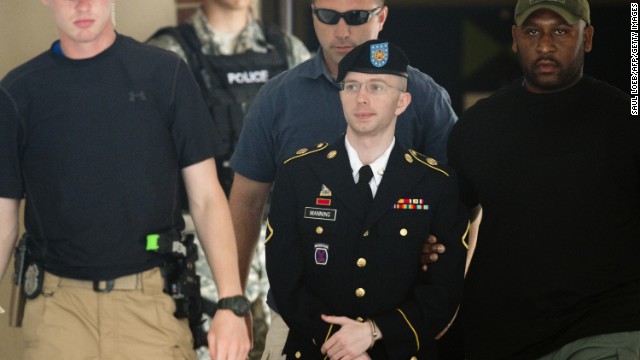
- Gabriel Schoenfeld: Manning admitted guilt, unlike supporters who call him innocent
- True, he was held in inhumane conditions, may have helped Arab Spring, he says
- But he put many in grave danger, and his supporters are interested in blackening U.S.
- It was not his decision to release material, he trampled on a democracy by doing it
Editor's note: Gabriel Schoenfeld is a senior fellow at the Hudson Institute in Washington, D.C., a policy research center that describes itself as working to promote national and global security and freedom. He is the author of "Necessary Secrets: National Security, the Media and the Rule of Law," published by W.W. Norton in 2010, and "A Bad Day on the Romney Campaign: An Insider's Account" published earlier this year by Penguin. Follow Schoenfeld on Twitter: @gabeschoenfeld.
(CNN) -- For passing hundreds of thousands of secret U.S. government documents to WikiLeaks, Pfc. Bradley Manning has been found guilty of violating the Espionage Act, but he was acquitted on the most serious charge of "aiding the enemy," a capital offense. Has justice been done?
In some quarters in the United States the question remains a burning one, and even more so in Europe where a movement of supporters has been active in his defense, decrying the conditions under which he was imprisoned while awaiting trial in a Quantico brig, and generally arguing that Manning is a whistleblower who they believe has done nothing more than expose American wrongdoing in Iraq, Afghanistan and around the world.
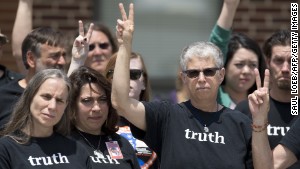
It's true that for a period of time, Manning was held in less than humane conditions for reasons that have never been convincingly justified. And there is no question that some good came out his revelations. After all, some of the documents he revealed about Tunisia, Bahrain and Egypt may well have helped to ignite the initial hopeful phase of the Arab Spring.
More generally, it is hard to argue that we are not all better informed by our ability to pore through hundreds of thousands of documents detailing the inner workings of American foreign policy.
But such benefits are completely beside the point. The United States, like every country, depends to a significant degree on secrecy in conducting diplomacy and defending itself in a dangerous world. But we are also a democracy. Our procedures for determining what should be kept secret and what should not have been developed by institutions that, whatever their flaws, are under the people's control, funded and overseen by the people's representatives in Congress and directed by an elected president.
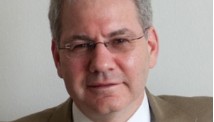
In a democracy, individual soldiers cannot be permitted to make decisions with such far-reaching consequences. When they do take such decisions into their own hands, they are trampling on the workings of a democracy and usurping a power that properly belongs to the American people.
This is something that Manning himself seemed to recognize when he pleaded guilty to a series of lesser charges earlier this year. Pressed by the judge on that occasion about how he reconciled his claim of doing something positive with his acknowledgment of wrongdoing, Manning explained, "Your honor, regardless of my opinion or my assessment of documents such as these, it's beyond my pay grade -- it's not my authority to make these decisions."
Manning was right. And he was also right on that occasion to accept the legal consequences of his actions. In that respect, he has been more consistent than many of his supporters, who have continued to profess his innocence and acclaim him as a hero even after Manning himself pleaded guilty and acknowledged serious wrongdoing.
Some of those same supporters, perhaps because their agenda is not really governmental transparency but blackening the name of the United States, are eager to ignore the high costs of Manning's actions. In a typical vein, one such supporter, Chris Hedges, formerly a reporter for The New York Times and now an activist at the Nation Institute, complains that Manning has been muzzled from talking about "crimes, torture and killing" committed by the United States and that the conditions under which he has been prosecuted, "familiar to many Muslim Americans tried in the so-called war on terror, presage a future of show trials and blind obedience."
 Greenwald: Manning did journalists' jobs
Greenwald: Manning did journalists' jobs 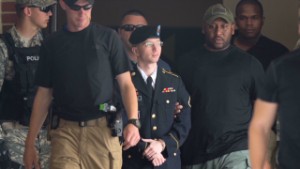 'Partial victory' in Manning case?
'Partial victory' in Manning case? 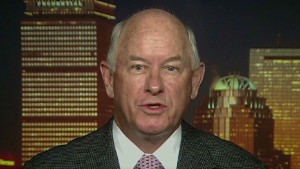 Crowley: Ellsberg only whistleblower
Crowley: Ellsberg only whistleblower Those spewing such left-wing anti-Americanism are eager to pass over the fact that many of the documents Manning passed to WikiLeaks were dropped onto the Internet by Julian Assange and contained the names of individuals around the world who had met with American diplomats or cooperated with American forces. Some of these individuals were simply innocent civilians in places like Iraq and Afghanistan who tried to help our soldiers. Others were dissidents and underground writers in repressive countries. Through Manning's actions, the lives of every one of these individuals was placed at risk.
Just to take one example of many, back in 2011 the Globe and Mail reported that leading Chinese academics and human rights campaigners were "attacked as 'rats' and 'spies' after their names were revealed as U.S. Embassy sources in the unredacted WikiLeaks cables that have now been posted online."
Among other things, the real names of a number of Chinese bloggers, previously only known by their screen names, were contained in some of the cables that Manning distributed. The Globe and Mail report comments: "The repercussions could indeed be dire in some circumstances, particularly for Tibetan and Uighur activists exposed as having passed information to Washington."
Is this kind of exposure the work of a legitimate whistleblower? The indiscriminate mass leaking that Manning engaged in was recklessness of a high order. However much one wants to temper justice with mercy when a young person commits a crime, it is Manning's recklessness that demands he face a harsh sentence.
By the same token, it is right that Manning was acquitted of the charge of "aiding the enemy." His crime did not aim so much at giving enemies an advantage as injuring the United States. Our government is acting fully within its rights and with justice on its side when it punishes someone who betrays his oath, abuses his position of responsibility in a way that weakens our country and imperils friends and allies around the world.
Follow @CNNOpinion on Twitter .
Join us at Facebook/CNNOpinion.
The opinions expressed in this commentary are solely those of Gabriel Schoenfeld.
Sex ring sting doesn't go far enough
- David Finkelhor: FBI, partners arrest 150 alleged pimps in child prostitution sweep
- He says problem more complex than arrest of pimps -- many child prostitutes are free agents
- He says policies, policing must address root of problem: neglect, sexual abuse at home
- Finkelhor: Programs that provide rehab programs, support can help prevent youths reverting
Editor's note: David Finkelhor is director of the Crimes Against Children Research Center and professor of sociology at the University of New Hampshire. He has been conducting research on victims of child sexual abuse since 1976.
(CNN) -- Kudos to the FBI and its partners for bringing needed attention to the neglected problem of juveniles engaged in prostitution. On Monday, they announced the results of Operation Cross Country, a coordinated multi-agency campaign in which 150 alleged pimps were arrested in a three-day sweep in 76 cities.
But it's a complex problem requiring a lot more than the arrest of pimps.
To combat this scourge, the public, the media and policymakers must better understand it. The stereotype is that criminally sophisticated exploiters are luring young girls into their clutches, trafficking them across the country and holding them in captivity through brutal intimidation. Such cases are only part of the reality.
There are many teens on the streets and on the Internet selling sexual services on their own without the involvement of any pimp -- 31% of cases in a recent national law enforcement survey fell into this category.
There are lots of boys in the trade, in addition to the girls, and most operate without pimps. Although this may not be typical of many cities, one recent massive effort to inventory the problem in New York City found nearly as many boys and girls.
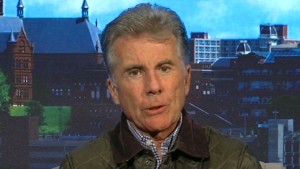 Walsh: It's the tip of the iceberg
Walsh: It's the tip of the iceberg  Police: Teen girls kept sex slaves
Police: Teen girls kept sex slaves  Trafficking survivor: Go after johns
Trafficking survivor: Go after johns Even for the girls with pimps, abduction and intimidation are not always the story. Teens who are prostituted may be attracted and bound to the life for the money, the perceived glamor, out of love for their pimp or allegiance to other girls or for a sense of family and security. They do not necessarily feel "rescued" when the law descends, and they often have nowhere else to be. Some go back as soon as they can.
We do need more law enforcement pressure on the pimps, on the sex sites and on the casinos, truck stops and motels where this crime occurs, and on the consumers who buy sex from underage youth. But other things are needed as well, programs that are not as compelling and easily funded as dramatic police raids.
We need ways of helping gay and transgender youth who are cast out of their families and communities and youth dealing with sexual abuse and other sexual trauma that so often pave the way into commercial sex. It means more mental health and social workers equipped and funded to work with this population.
We need better ways of identifying and treating youth with drug addictions, so they don't start selling sex to feed their habit.
We need vocational opportunities for marginal youth, so they don't see the sex trade as their only avenue to economic survival. These would be similar to the job skills training programs used with other children mired in the juvenile justice system.
We need more shelters for teens who have run away or have been driven out of their homes due to abuse or intolerable family conflict, so they are not hanging out in the places where exploitation begins. Such shelters could look like the transitional independent living facilities in cities such as New York.
We need more effective child abuse and neglect intervention programs and therapeutic foster homes since the child welfare system is the staging area for entry into prostitution for so many of the youth. The availability of therapeutic foster homes and highly trained parents, surrounded by intensive services, are proven methods to deal with the high rate of failure among abused teens who are placed in families.
We need support groups and rehabilitation programs for those trying to keep themselves from gravitating back to the life.
Unfortunately, these are not always easy youth to help. They are often angry, suspicious, traumatized, addicted, impatient, crime-involved, prematurely sexualized young people who do not endear themselves to police and would-be helpers. They may visit a counselor, try to go back home, sign up for help but too often they return to the trade or become entangled in crime.
Arrests make great publicity. But it is only through a multidisciplinary comprehensive mobilization of dedicated child welfare, social service, mental health, drug rehabilitation, educational systems -- working together with law enforcement -- that we will find a solution to young people being sold or selling sex for money and survival.
Follow @CNNOpinion on Twitter .
Join us at Facebook/CNNOpinion.
The opinions expressed in this commentary are solely those of David Finkelhor.
What the pope left out about women
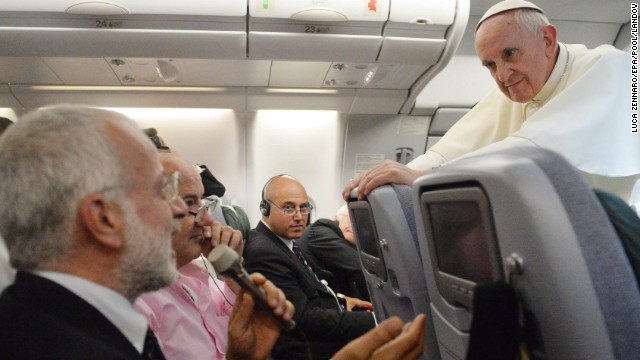 Pope Francis makes some unexpected comments on issues facing the Roman Catholic Church on Monday, July 29. He spoke on the record to journalists on a flight back back to Italy from Brazil after finishing his first international trip as pontiff. Among the topics he addressed were homosexuality, the church's alleged "gay lobby," the role of women, abortion, divorce and the Vatican Bank.
Pope Francis makes some unexpected comments on issues facing the Roman Catholic Church on Monday, July 29. He spoke on the record to journalists on a flight back back to Italy from Brazil after finishing his first international trip as pontiff. Among the topics he addressed were homosexuality, the church's alleged "gay lobby," the role of women, abortion, divorce and the Vatican Bank. 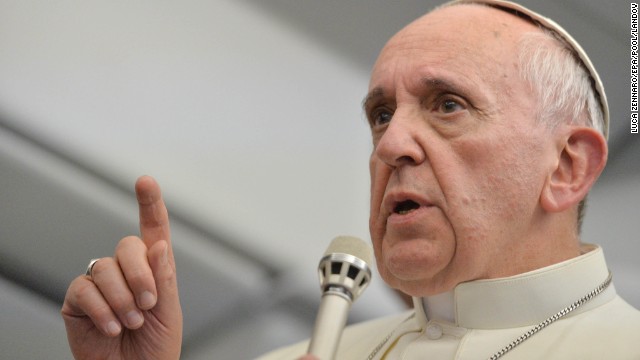 On the flight, Francis said he will not "judge" gay priests, a huge shift from his predecessor, Pope Emeritus Benedict XVI, who sought to bar men with "homosexual tendencies." "If someone is gay and he searches for the Lord and has good will, who am I to judge?" Francis said.
On the flight, Francis said he will not "judge" gay priests, a huge shift from his predecessor, Pope Emeritus Benedict XVI, who sought to bar men with "homosexual tendencies." "If someone is gay and he searches for the Lord and has good will, who am I to judge?" Francis said. 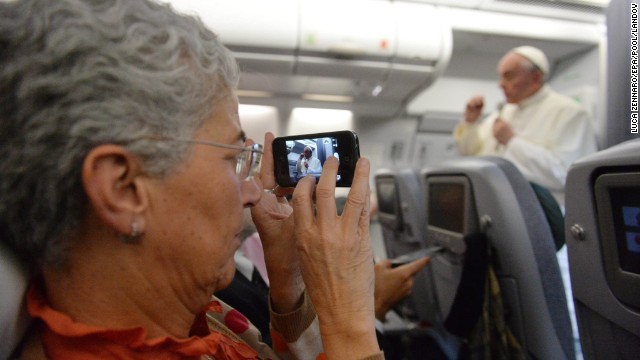 A journalist takes a picture of Pope Francis during the press conference on the flight back to Italy. The pope said the role of women in the church should be deeper, but he brushed aside the possibility of women being ordained as priests. "The church says no. That door is closed."
A journalist takes a picture of Pope Francis during the press conference on the flight back to Italy. The pope said the role of women in the church should be deeper, but he brushed aside the possibility of women being ordained as priests. "The church says no. That door is closed." 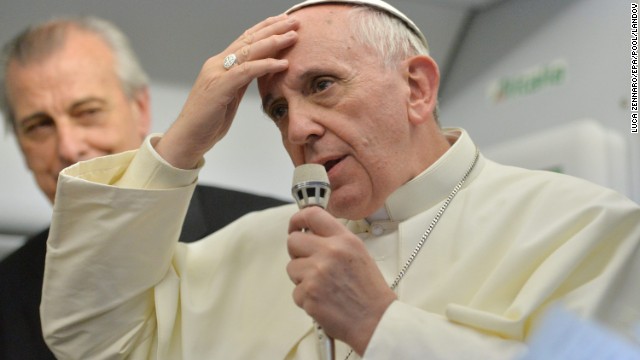 Francis said he had nothing to say about abortion while in Brazil because church teachings against it were clear and his trip was the time for "positive" news.
Francis said he had nothing to say about abortion while in Brazil because church teachings against it were clear and his trip was the time for "positive" news. 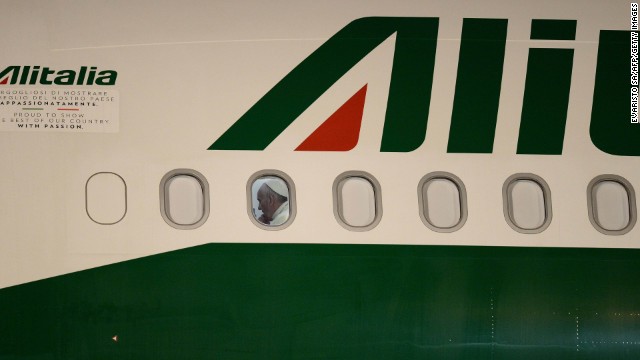 Pope Francis sits inside the plane at a Rio de Janeiro air base Sunday, July 28, before departing for Rome. On the trip back, the pope said cardinals were exploring the question of whether divorced people can receive communion, which they are currently banned from doing. He also said he was unsure what to do with the Vatican Bank, which has faced corruption allegations recently.
Pope Francis sits inside the plane at a Rio de Janeiro air base Sunday, July 28, before departing for Rome. On the trip back, the pope said cardinals were exploring the question of whether divorced people can receive communion, which they are currently banned from doing. He also said he was unsure what to do with the Vatican Bank, which has faced corruption allegations recently. - Alice L. Laffey: Pope Francis says Catholic Church needs "deep theology of women"
- But she says many will accuse church of discrimination as long as it denies women priesthood
- She says jury still out: By some theological readings, women not precluded from priesthood
- Laffey: His warm stance toward women in church bodes well for taking on issues of poverty
Editor's note: Alice L. Laffey is an associate professor in the Department of Religious Studies at the College of the Holy Cross. She was a member of the Women's Ordination Conference after Vatican II and published "An Introduction to the Old Testament : A Feminist Perspective" (Fortress, 1988) and several articles on power for the College Theology Society's annual volume. She is working on contributions to Carol Dempsey's forthcoming volume on Isaiah for the Wisdom Commentary Series (Liturgical Press).
(CNN) -- When Pope Francis gave his now-famous, 80-minute interview on the plane back to Rome from Brazil, he was asked, not surprisingly, about the role of women in the Roman Catholic Church. He said that John Paul II had "closed the door" to the possibility of women priests, but he affirmed that the church lacked "a deep theology of women." His comments conveyed a deep respect for women.
Whatever Francis' own virtues, however, the church will continue to be accused of sexual discrimination, especially by many Americans and Europeans, as long as it denies the priesthood to women.

No matter what efforts Pope Francis makes with respect to women, if he refuses to move the ordination question forward, many, including Catholics, will consider his efforts toward women as insufficient or even hypocritical.
That John Paul II "closed the door" to women's ordination is undoubtedly true, but the door may not be closed for all time. After John Paul II's pronouncement against the ordination of women, the Catholic Theological Society of America, the country's leading professional society of Roman Catholic theologians, at its June 1997 meeting, endorsed a resolution indicating that there are "serious doubts regarding the nature of the authority of the teaching" that the church lacks the authority to ordain women to the priesthood and that the all-male priesthood is a truth that has been infallibly taught and that the faithful must accept.
The resolution continued that "there is serious, widespread disagreement on this question not only among theologians, but also within the larger community of the Church," and recommended it be given further "study, discussion and prayer."
But the ordination of women is not the most pressing question for most Catholics or even for most Catholic women. Women also experience discrimination and exclusion in the secular sphere in the United States and Europe, but their exclusion and discrimination in the developing world are far greater.
 Quinn: Pope's comments 'positive'
Quinn: Pope's comments 'positive' 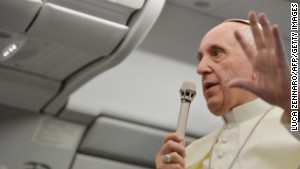 Pope says he won't judge gay priests
Pope says he won't judge gay priests 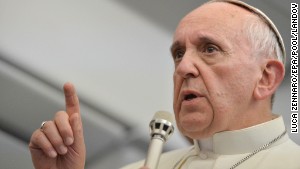 Change in papacy's tone 'revolutionary'
Change in papacy's tone 'revolutionary' Throughout the world, women and their children make up the greatest percentage of human beings living in destitution. Their main concern is not women priests but food, health, education and physical safety. Francis' genuine concern for the real lives of the poor and suffering warmly embraces women.
Pope Francis is charting new territory. I don't know how Pope Gregory the Great acted out his self-understanding of the pope as the "servant of the servants of God" -- the humble designation he first used -- in the sixth century, but clearly Francis sees himself as a leader who is committed to serving.
Many commentators have pointed out his letting go of the material trappings of hierarchy and exclusion, from Prada shoes to papal apartments, and they have commented favorably on his compassion for the poor, his desire to lead all the faithful to a discipleship of service. Francis clearly sees himself as a disciple, and wishes to set an example like that of his namesake, from Assisi, who said, "Preach the Gospel, using words when necessary."
Will Pope Francis advance the conversation regarding the ordination of women? I suspect he will not. But I think his behavior toward all, from the most powerful to the least, but acting very explicitly without judgment and with love and compassion on behalf of the least -- most of whom are women -- will "open the door" to future conversation.
Follow us on Twitter @CNNOpinion.
Join us on Facebook/CNNOpinion.
The opinions expressed in this commentary are solely those of Alice L. Laffey.
Al Qaeda's ice cream eating contest
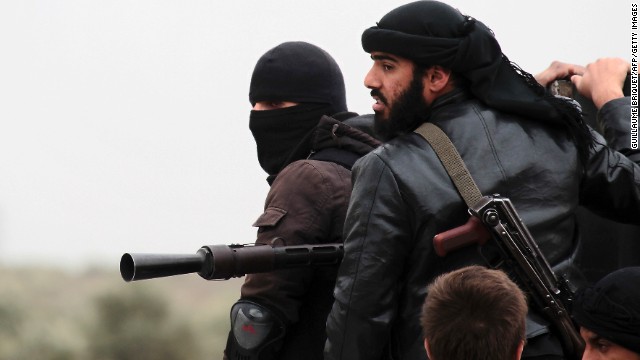
- Writers: Al Qaeda posting feel-good videos, holding ice cream eating contests, tugs of war
- They say al Qaeda and affiliates want to win "hearts and minds," but the groups have failed
- Writers: Al Qaeda fighters in Syria try sugar and spice tack, but in Iraq they kill civilians
- New image will not win over people appalled by murder in the name of Islam, they say
Editor's note: Peter Bergen is CNN's national security analyst, a director at the New America Foundation and the author of "Manhunt: The Ten-Year Search for bin Laden -- From 9/11 to Abbottabad." Jennifer Rowland is a program associate at the New America Foundation.
(CNN) -- An al Qaeda-produced video posted on a website in early July opens with uplifting images of smiling Syrian children and jovial old men listening to speeches delivered by al Qaeda militants.
The video seems startlingly out of place on a website usually devoted to serious young men learning to fire machine guns, bloodshed and graphic images of civilian casualties purportedly caused by U.S. forces in Iraq and Afghanistan.
Instead, the video, featured on a site aligned with al Qaeda, shows a Jordanian member of al Qaeda's affiliate in Syria insisting that his group's poor image is just a myth propagated by Western media. He says: "The international channels try to twist the picture and portray the mujahedeen as bloodthirsty, as distanced from the people -- that they reject the people and don't love them." As the Jordanian militant speaks, young Syrian boys crowd around him.

Al Qaeda-affiliated fighters have set up "Advocacy Tents" in Syria's largest city, Aleppo, where the jihadists can "educate the people on our point of view."
In another apparent attempt to soften its image, al Qaeda members in Syria held something akin to a town fair. Another al Qaeda video produced in Syria surfaced online in July, this one showing an al Qaeda-organized ice cream-eating contest in Aleppo.
Around the same time, an Arabic-language news outlet, Aleppo News, published a video of a tug-of-war between members of the two al Qaeda-affiliated rebel groups fighting in Syria. In the video, crowds of young boys and older men cheer on the members of al Qaeda.
Al Qaeda and its regional franchises understand they need to try to win the "heart and minds" of the local population; something they have generally failed to do in the past and something that the leaders of these groups have come to understand is a major problem.
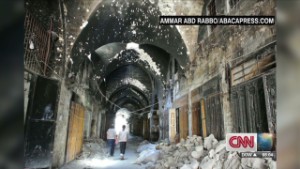 Syrian photographer documents destruction
Syrian photographer documents destruction  Report: al Qaeda missile manual found
Report: al Qaeda missile manual found In documents recovered in Osama bin Laden's compound in Abbottabad, Pakistan, bin Laden and his top advisers privately criticized the brutal tactics of al Qaeda in Iraq, which had provoked a tribal uprising known as "the Sunni Awakening" that almost destroyed al Qaeda's Iraqi affiliate in 2006 and 2007.
Now, al Qaeda in Iraq and in neighboring Syria are experiencing a revival, a revival at least somewhat fueled by al Qaeda learning from some of the mistakes it made during the previous decade in Iraq.
This is significant because al Qaeda's Syrian affiliate, al Nusra, is widely considered to be the most effective rebel force fighting the Assad regime, and the group pledged allegiance to the leader of al Qaeda, Ayman al-Zawahiri, in April.
But videos of al Qaeda militants playing tug-of-war or joking with members of the local community are hardly signs of moderation.
Al Qaeda's Syrian branch releases lengthy and passionate sermons dedicated to denouncing Shi'a Muslims as apostates who should be killed.
And although some al Qaeda fighters in Syria might be engaging the public with ice cream, games and conversation, their colleagues in neighboring Iraq continue to launch bloody attacks on civilians.
On Monday, at least 50 people were killed in 15 separate car bomb attacks in Baghdad. Many of those bombings are believed be the work of al Qaeda's Iraqi affiliate.
In all likelihood, al Qaeda and its allied groups are doing too little, too late, in their quest to win the public's hearts and minds.
The group's senior leaders recognized the dangers of killing too many Muslim civilians as far back as 2005, when Zawahiri reprimanded the founder of al Qaeda in Iraq, Abu Musab al-Zarqawi, for alienating the Iraqi people with indiscriminate violence.
And the majority of Muslims around the world reject violence in the name of Islam, particularly in the form of suicide bombings. This is unsurprising, given that al Qaeda's violence has primarily claimed Muslim lives.
It will take a lot more than ice cream socials to undo that damage.
Follow us on Twitter @CNNOpinion.
Join us on Facebook/CNNOpinion.
The opinions expressed in this commentary are solely those of Peter Bergen and Jennifer Rowland.
Morsy should quit to save Egypt
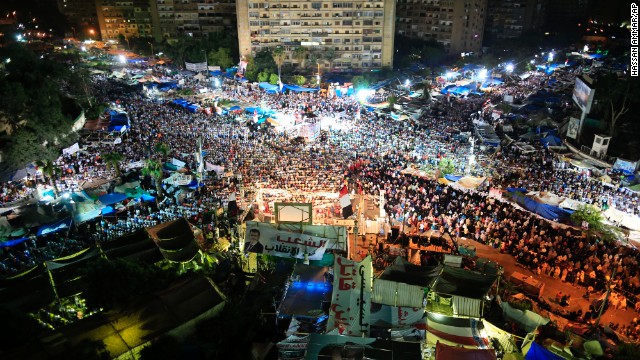 Supporters of Egypt's deposed President Mohammed Morsy gather for prayers at Nasr City, where protesters have installed a camp and hold daily rallies, in Cairo, Egypt, on Sunday, July 28, 2013. The military ousted Morsy, Egypt's first democratically elected president, in early July after days of mass demonstrations. Dozens of Morsy backers angry at Egypt's military-backed government have died in weekend violence in the volatile nation's capital. See photos of protests that have engulfed the country.
Supporters of Egypt's deposed President Mohammed Morsy gather for prayers at Nasr City, where protesters have installed a camp and hold daily rallies, in Cairo, Egypt, on Sunday, July 28, 2013. The military ousted Morsy, Egypt's first democratically elected president, in early July after days of mass demonstrations. Dozens of Morsy backers angry at Egypt's military-backed government have died in weekend violence in the volatile nation's capital. See photos of protests that have engulfed the country. 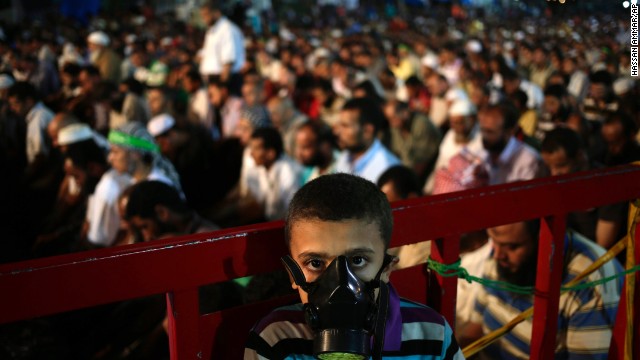 A boy wears a tear gas mask as supporters of Egypt's ousted President Mohammed Morsy pray at the camp set up by supporters in the Nasr City area of Cairo on July 28.
A boy wears a tear gas mask as supporters of Egypt's ousted President Mohammed Morsy pray at the camp set up by supporters in the Nasr City area of Cairo on July 28. 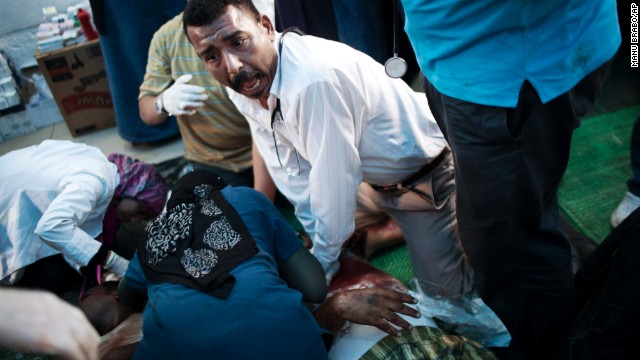 Doctors treat an injured supporter of deposed Egyptian President Mohamed Morsy during clashes with security forces in Cairo on Saturday, July 27.
Doctors treat an injured supporter of deposed Egyptian President Mohamed Morsy during clashes with security forces in Cairo on Saturday, July 27. 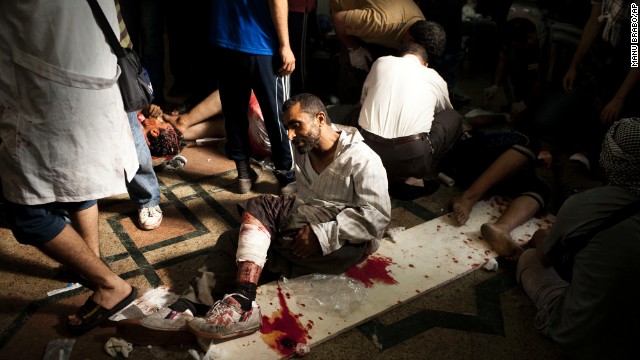 A wounded Morsy supporter lies on the floor of a field hospital in Cairo on July 27. Thousands of Morsy supporters gathered Saturday in the Nasr City neighborhood despite dozens of deaths the night before and veiled threats from the military.
A wounded Morsy supporter lies on the floor of a field hospital in Cairo on July 27. Thousands of Morsy supporters gathered Saturday in the Nasr City neighborhood despite dozens of deaths the night before and veiled threats from the military. 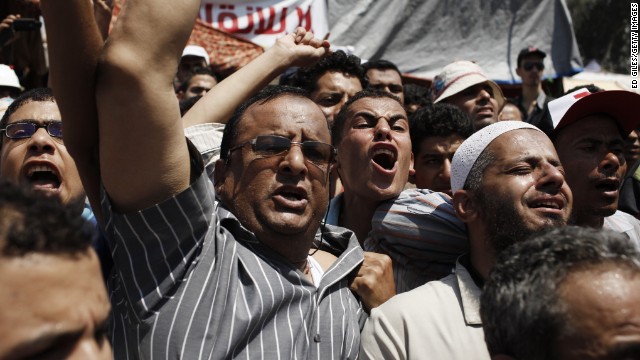 Supporters of Morsy protest outside a field hospital in Cairo where the bodies of slain Morsy supporters have been brought July 27.
Supporters of Morsy protest outside a field hospital in Cairo where the bodies of slain Morsy supporters have been brought July 27. 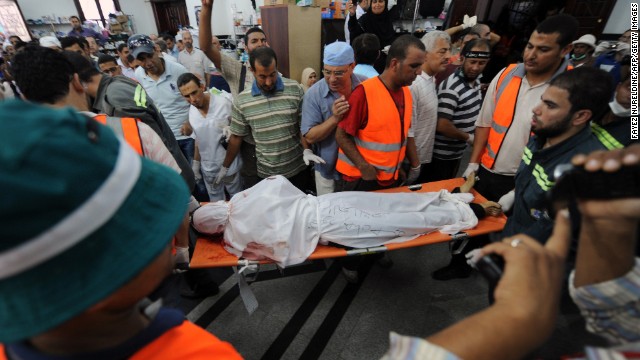 The body of a Muslim Brotherhood protester, reportedly shot dead after violence erupted the night before, is moved as mourners watch inside a field hospital in Cairo on July 27.
The body of a Muslim Brotherhood protester, reportedly shot dead after violence erupted the night before, is moved as mourners watch inside a field hospital in Cairo on July 27. 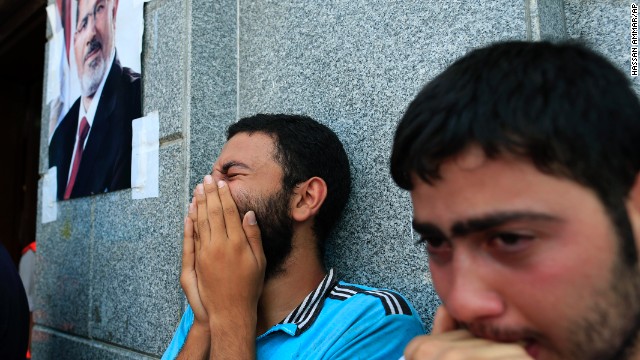 Two men mourn Morsy supporters who were killed in overnight clashes with security forces, in Cairo, on July 27.
Two men mourn Morsy supporters who were killed in overnight clashes with security forces, in Cairo, on July 27. 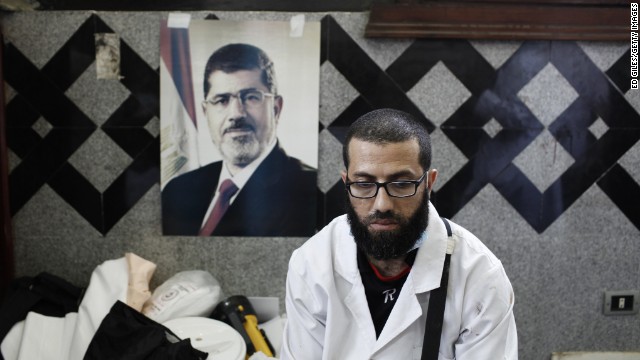 A medic pauses at a field hospital in Cairo on July 27 after tending to the bodies of Morsy supporters reportedly killed in fighting.
A medic pauses at a field hospital in Cairo on July 27 after tending to the bodies of Morsy supporters reportedly killed in fighting. 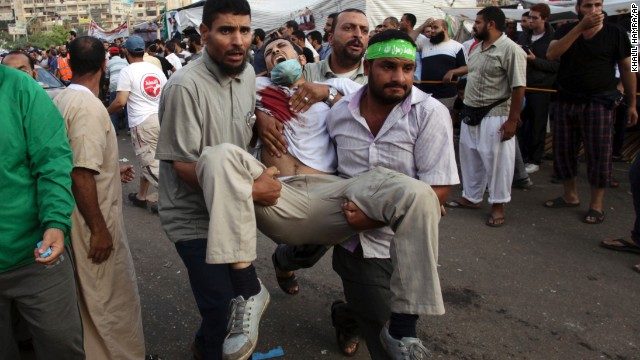 Supporters of Morsy carry an injured man to a field hospital amid clashes with security forces in Cairo on July 27.
Supporters of Morsy carry an injured man to a field hospital amid clashes with security forces in Cairo on July 27. 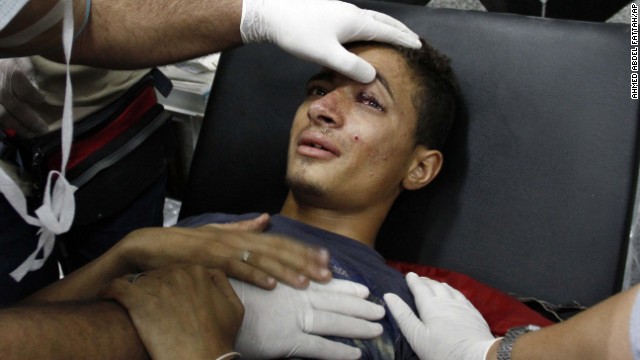 Doctors treat a Morsy supporter injured during clashes with security forces in Cairo on July 27.
Doctors treat a Morsy supporter injured during clashes with security forces in Cairo on July 27. 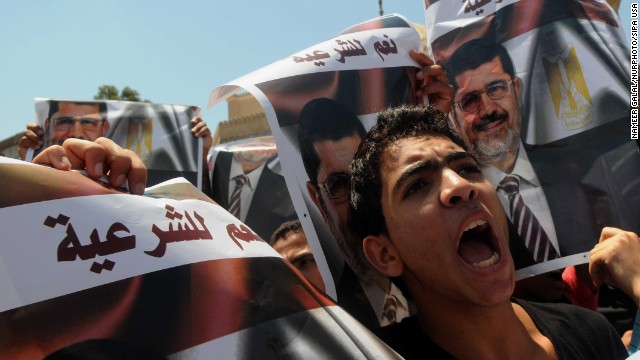 Supporters of Morsy rally in Giza, on Friday, July 26.
Supporters of Morsy rally in Giza, on Friday, July 26. 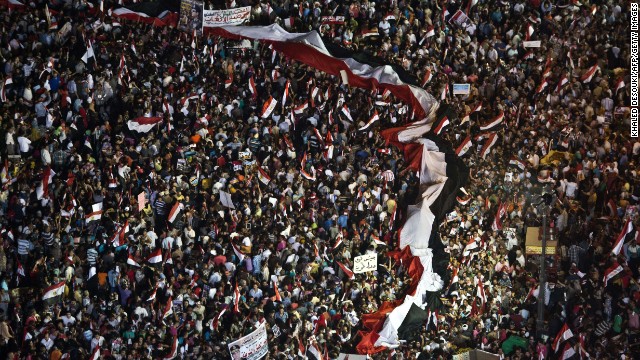 Supporters of the Egyptian military rally at Tahrir Square in Cairo on Friday, July 26.
Supporters of the Egyptian military rally at Tahrir Square in Cairo on Friday, July 26. 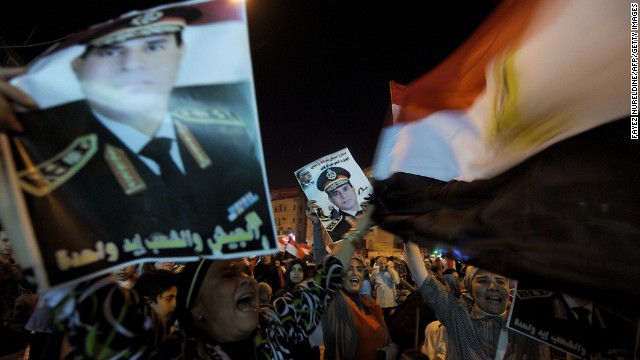 Morsy opponents rally in Cairo on July 26.
Morsy opponents rally in Cairo on July 26. 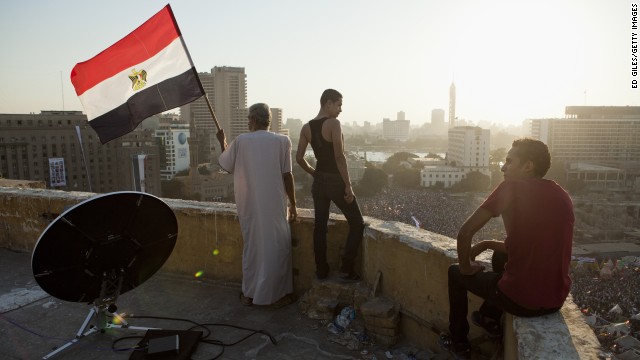 Morsy opponents watch a demonstration from a rooftop near Tahrir Square in Cairo on July 26.
Morsy opponents watch a demonstration from a rooftop near Tahrir Square in Cairo on July 26. 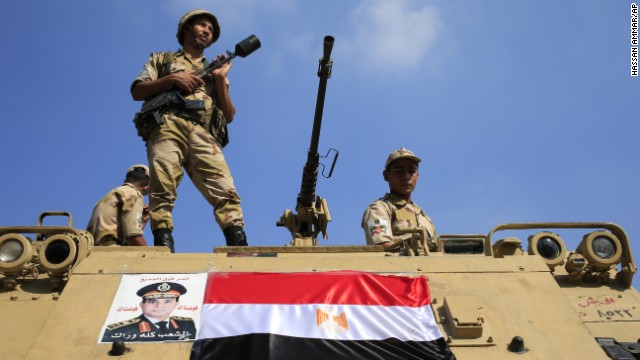 Egyptian soldiers stand guard atop an armored vehicle on a bridge leading to Cairo's Tahrir Square on Friday, July 26.
Egyptian soldiers stand guard atop an armored vehicle on a bridge leading to Cairo's Tahrir Square on Friday, July 26. 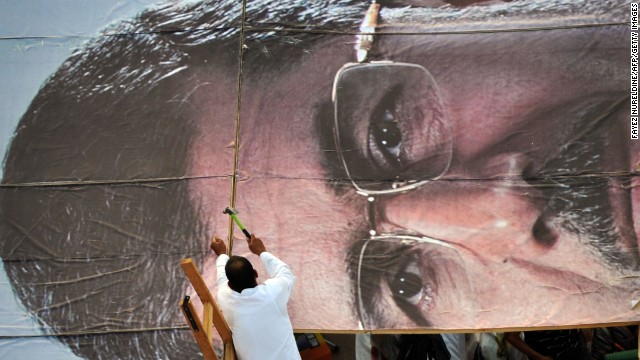 A Morsy advocate builds a giant portrait of the deposed president Thursday, July 25, while other supporters hold a sit-in outside a Cairo mosque. The military has detained Morsy while an interim government takes shape.
A Morsy advocate builds a giant portrait of the deposed president Thursday, July 25, while other supporters hold a sit-in outside a Cairo mosque. The military has detained Morsy while an interim government takes shape. 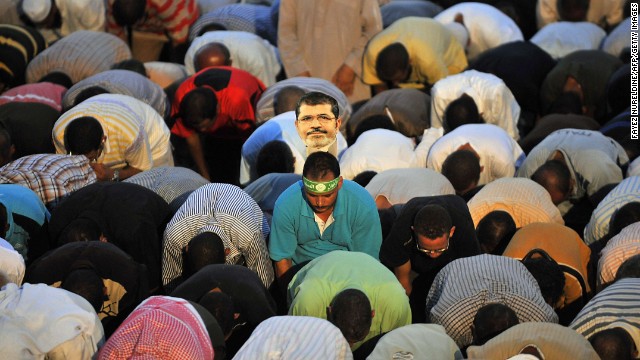 Morsy supporters say evening prayers during a rally July 25 outside a Cairo mosque.
Morsy supporters say evening prayers during a rally July 25 outside a Cairo mosque. 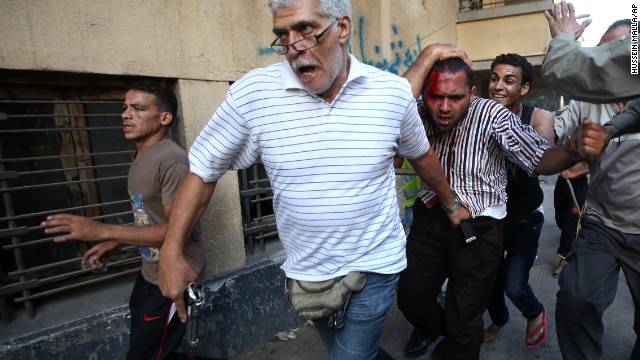 A man with a pistol and other Morsy opponents detain a suspected Morsy supporter who was wounded during clashes in Cairo on Monday, July 22. Supporters and opponents clashed near the city's Tahrir Square.
A man with a pistol and other Morsy opponents detain a suspected Morsy supporter who was wounded during clashes in Cairo on Monday, July 22. Supporters and opponents clashed near the city's Tahrir Square. 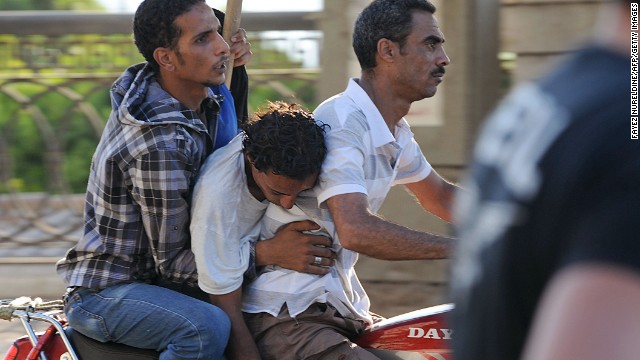 Men evacuate an injured opponent of Morsy during clashes with his supporters in Cairo on July 22.
Men evacuate an injured opponent of Morsy during clashes with his supporters in Cairo on July 22. 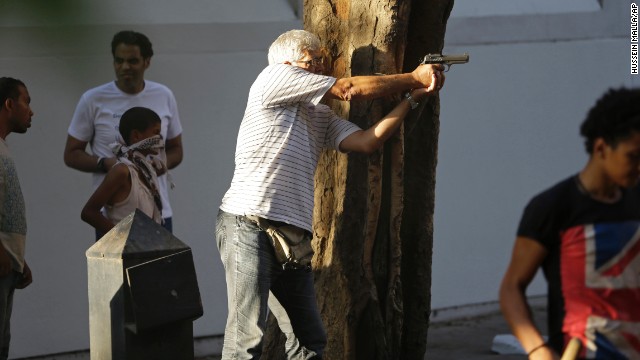 A man fires a gun during clashes between opponents and supporters of Morsy in Cairo on July 22.
A man fires a gun during clashes between opponents and supporters of Morsy in Cairo on July 22. 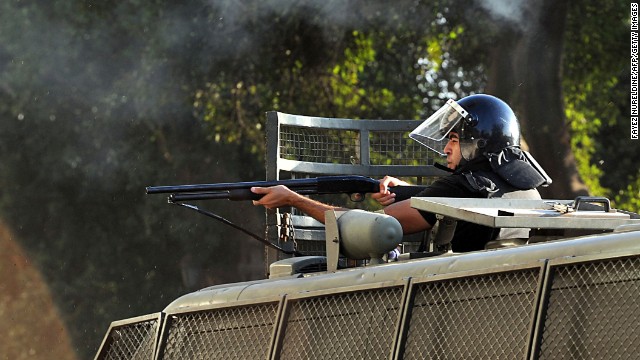 A riot police officer aims rubber bullets toward Morsy supporters in Cairo on July 22.
A riot police officer aims rubber bullets toward Morsy supporters in Cairo on July 22. 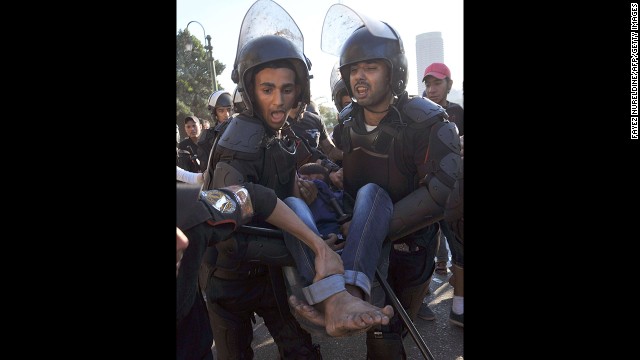 Riot police evacuate an injured anti-Morsy protester in Cairo on July 22.
Riot police evacuate an injured anti-Morsy protester in Cairo on July 22. 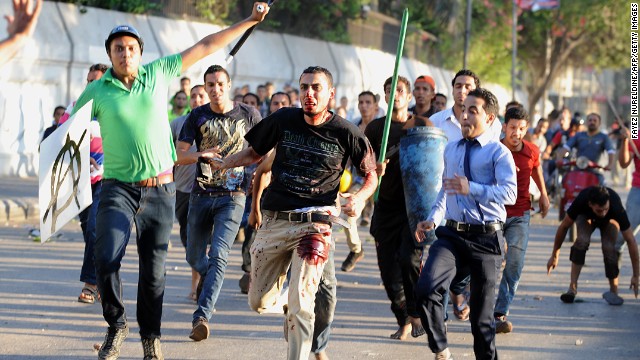 A Morsy supporter, center, who was allegedly beaten by opponents of Morsy runs during clashes in Cairo on July 22.
A Morsy supporter, center, who was allegedly beaten by opponents of Morsy runs during clashes in Cairo on July 22. 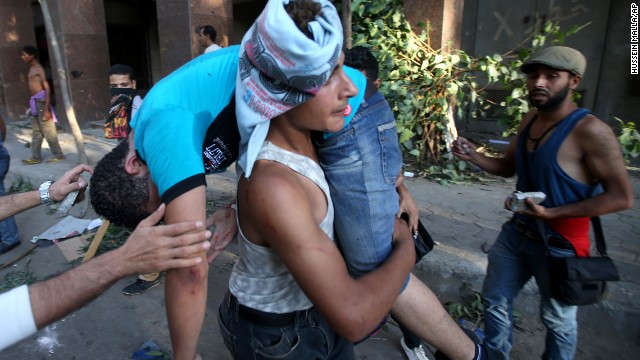 A Morsy opponent carries his injured friend in Cairo on July 22.
A Morsy opponent carries his injured friend in Cairo on July 22. 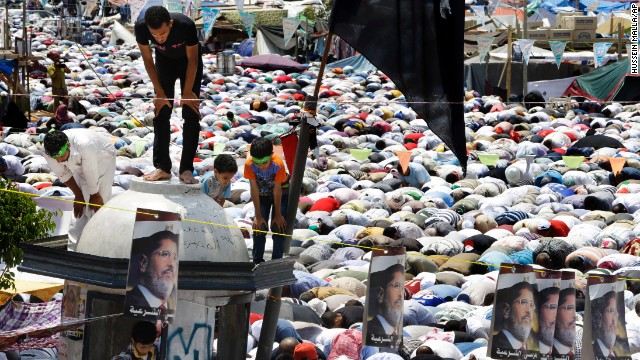 Supporters of Morsy pause for Friday prayers on July 19 at Nasr City in Cairo, where protesters have installed their camp and held daily rallies.
Supporters of Morsy pause for Friday prayers on July 19 at Nasr City in Cairo, where protesters have installed their camp and held daily rallies. 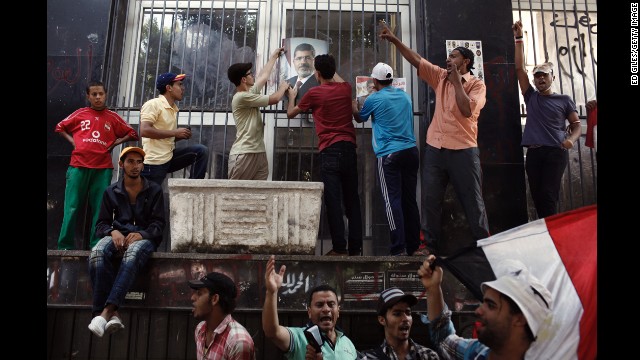 Morsy supporters take part in a protest march near government ministry buildings on Wednesday, July 17, in Cairo.
Morsy supporters take part in a protest march near government ministry buildings on Wednesday, July 17, in Cairo. 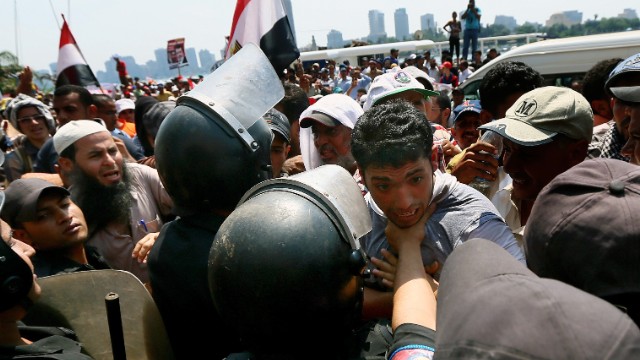 A Morsy supporter is held back by riot police during a rally near Tahrir Square on July 17.
A Morsy supporter is held back by riot police during a rally near Tahrir Square on July 17. 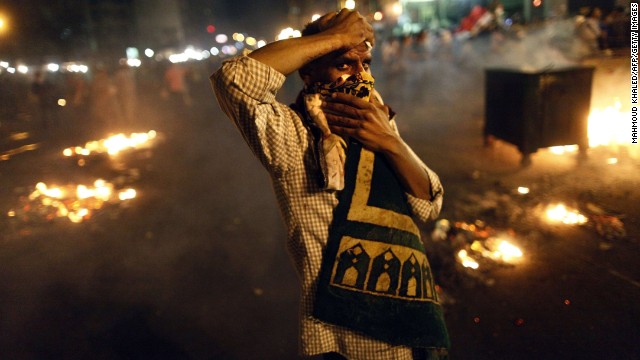 A supporter of the Muslim Brotherhood and of Morsy covers his mouth under the 6th October Bridge in Cairo on Tuesday, July 16.
A supporter of the Muslim Brotherhood and of Morsy covers his mouth under the 6th October Bridge in Cairo on Tuesday, July 16. 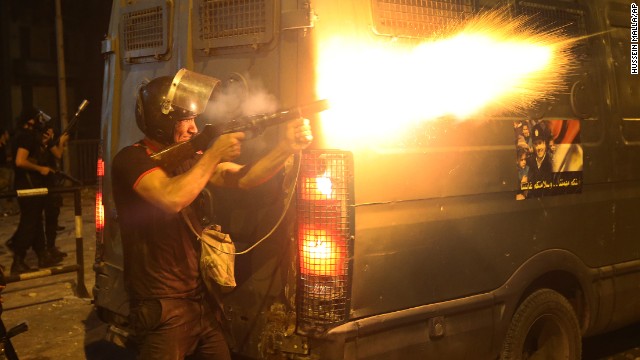 A riot police officer fires tear gas toward Morsy supporters during clashes in Cairo on Monday, July 15.
A riot police officer fires tear gas toward Morsy supporters during clashes in Cairo on Monday, July 15. 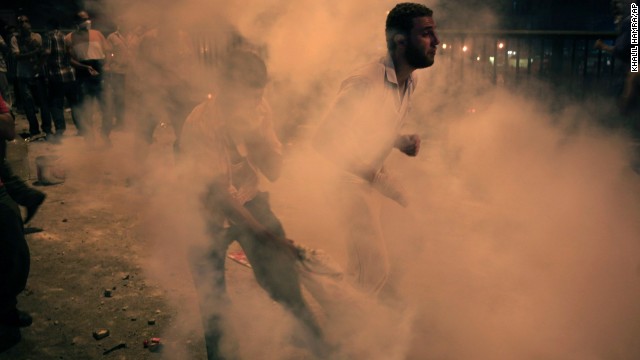 Morsy supporters run from tear gas in Cairo on July 15.
Morsy supporters run from tear gas in Cairo on July 15. 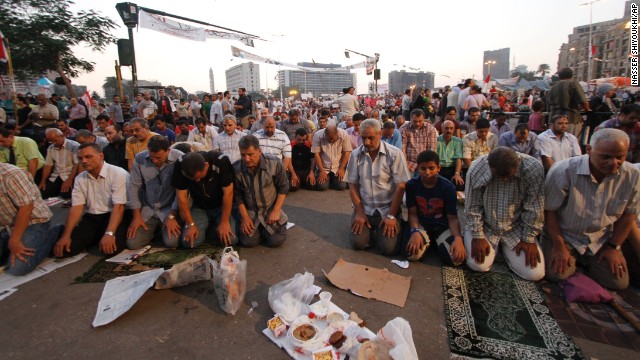 Egyptians in Cairo's Tahrir Square pray before breaking their fast on the third day of Ramadan, the sacred holy month for Muslims, on Friday, July 12.
Egyptians in Cairo's Tahrir Square pray before breaking their fast on the third day of Ramadan, the sacred holy month for Muslims, on Friday, July 12. 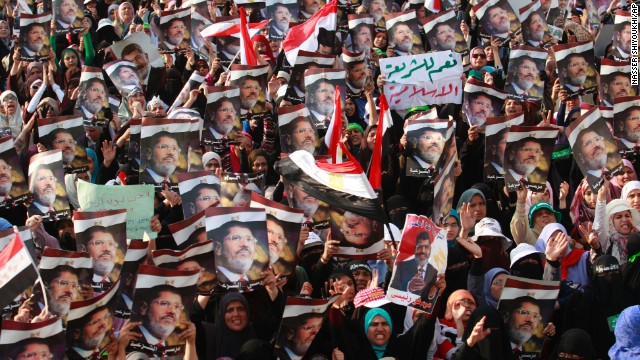 Supporters of the deposed Morsy rally in Nasr City, Egypt, a suburb of Cairo, on Monday, July 8.
Supporters of the deposed Morsy rally in Nasr City, Egypt, a suburb of Cairo, on Monday, July 8. 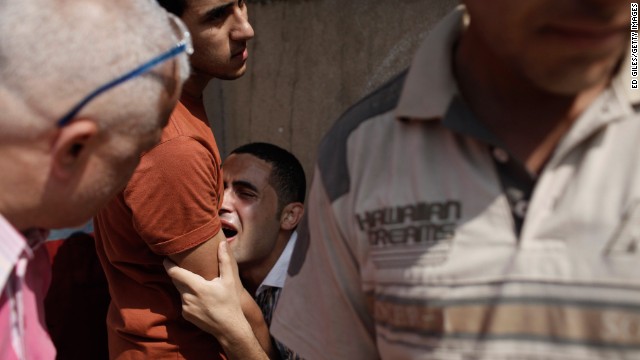 A man reacts after seeing the body of a family member at the Liltaqmeen al-Sahy Hospital in Cairo, allegedly killed during a sit-in supporting Morsy in front of the Republican Guard headquarters on July 8.
A man reacts after seeing the body of a family member at the Liltaqmeen al-Sahy Hospital in Cairo, allegedly killed during a sit-in supporting Morsy in front of the Republican Guard headquarters on July 8. 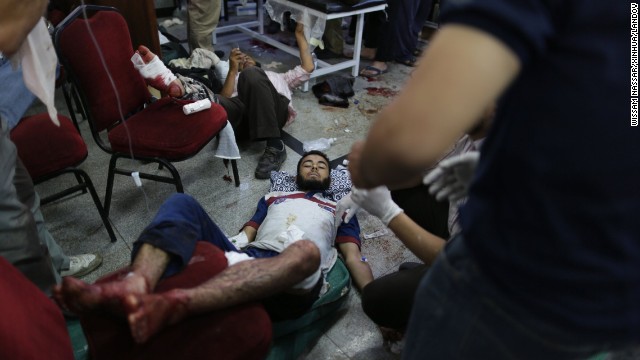 Injured men receive medical attention after clashes between supporters of Morsy and security forces in Cairo on July 8.
Injured men receive medical attention after clashes between supporters of Morsy and security forces in Cairo on July 8. 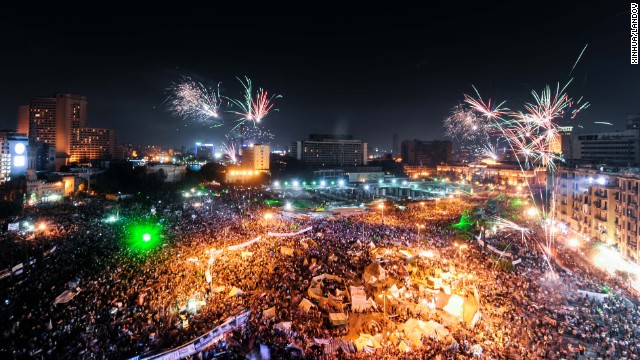 Opponents of Mohamed Morsy gather at Tahrir Square during a protest in Cairo on Sunday, July 7.
Opponents of Mohamed Morsy gather at Tahrir Square during a protest in Cairo on Sunday, July 7. 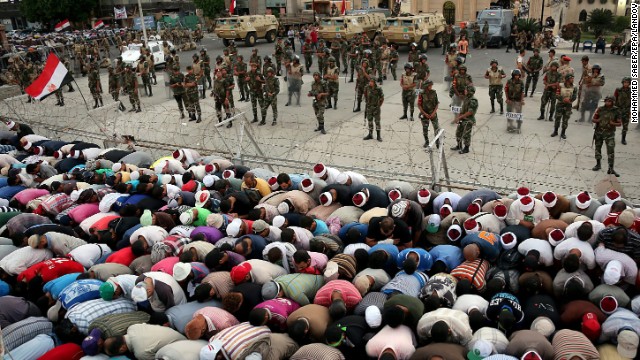 Supporters of Morsy pray next to the headquarters of the Republican Guards in Cairo on Saturday, July 6, during the funeral of seven people killed during clashes.
Supporters of Morsy pray next to the headquarters of the Republican Guards in Cairo on Saturday, July 6, during the funeral of seven people killed during clashes. 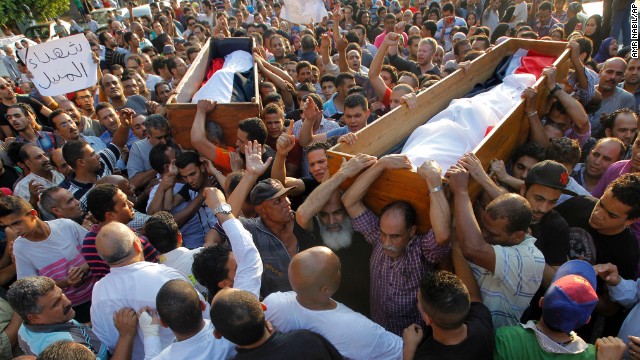 People carry coffins on July 6 of two Morsy opponents who were killed during clashes in Cairo.
People carry coffins on July 6 of two Morsy opponents who were killed during clashes in Cairo. 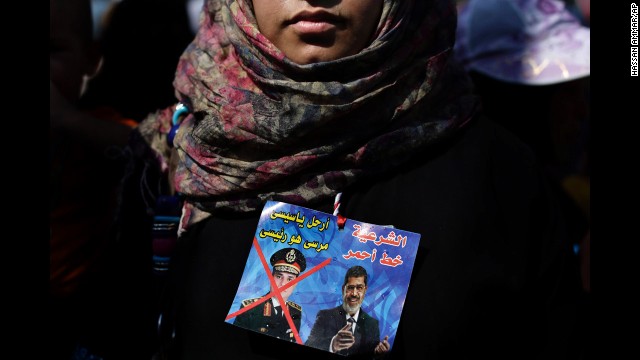 A Morsy supporter joins protests near the University of Cairo in Giza on July 6.
A Morsy supporter joins protests near the University of Cairo in Giza on July 6. 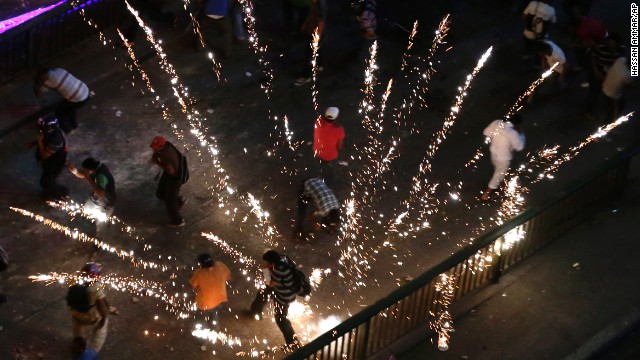 Supporters and opponents of Morsy clash in Cairo on Friday, July 5.
Supporters and opponents of Morsy clash in Cairo on Friday, July 5. 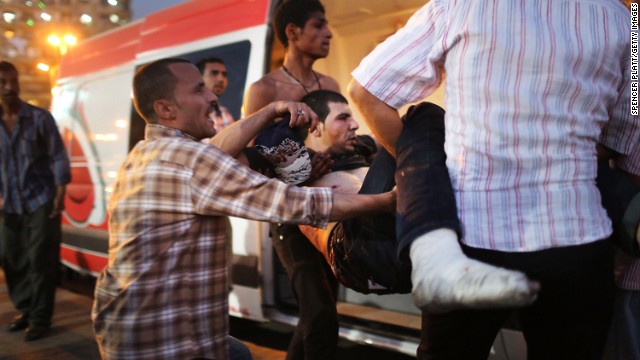 A protester is attended to in Cairo's Tahrir Square during fighting between the pro- and anti-Morsy crowds on July 5.
A protester is attended to in Cairo's Tahrir Square during fighting between the pro- and anti-Morsy crowds on July 5. 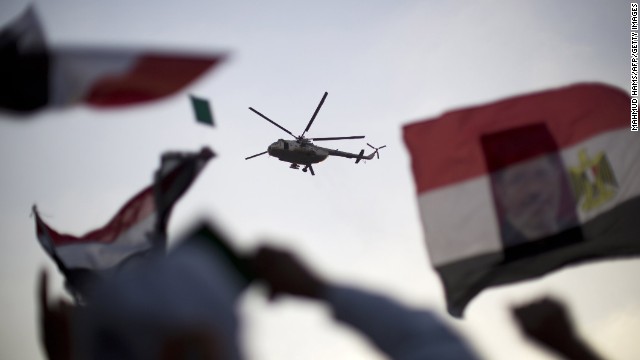 An Egyptian military helicopter hovers over supporters of the Muslim Brotherhood and deposed President Mohamed Morsy in Cairo on July 5.
An Egyptian military helicopter hovers over supporters of the Muslim Brotherhood and deposed President Mohamed Morsy in Cairo on July 5. 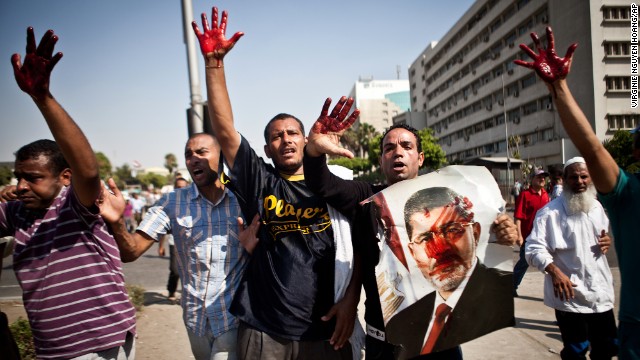 Morsy supporters hold up their bloodstained hands after Egypt's armed forces opened fire on rally in front of the Republican Guard headquarters in Cairo on July 5.
Morsy supporters hold up their bloodstained hands after Egypt's armed forces opened fire on rally in front of the Republican Guard headquarters in Cairo on July 5. 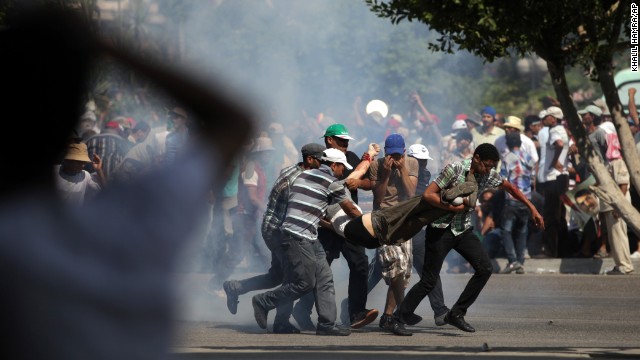 Morsy supporters carry a man who was shot during clashes next to the Republican Guard headquarters in Cairo on July 5. State broadcaster Nile TV said a number of those backing the deposed leader were wounded as they tried to storm the headquarters, where Morsy reportedly was being held.
Morsy supporters carry a man who was shot during clashes next to the Republican Guard headquarters in Cairo on July 5. State broadcaster Nile TV said a number of those backing the deposed leader were wounded as they tried to storm the headquarters, where Morsy reportedly was being held. 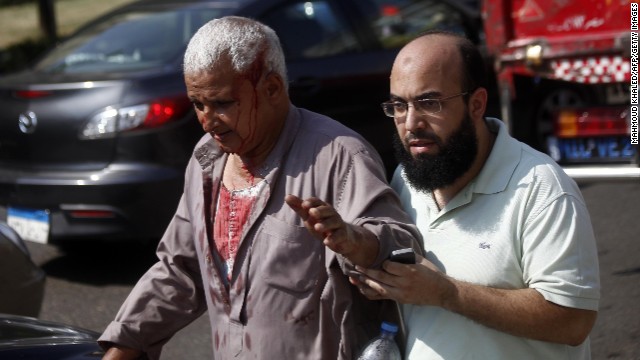 A wounded man is helped following the gun battle outside the headquarters of the Republican Guard on July 5.
A wounded man is helped following the gun battle outside the headquarters of the Republican Guard on July 5. 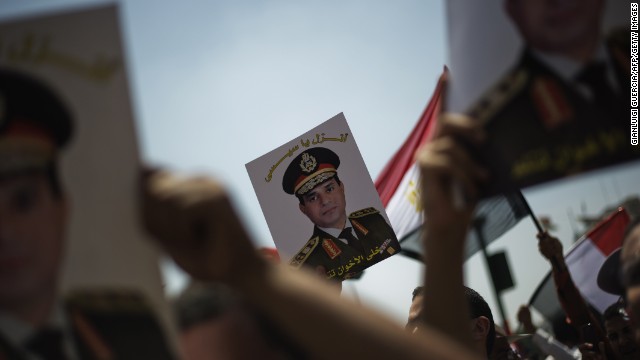 Egyptians hold portraits of Gen. Abdel-Fatah El-Sisi reading "Come down, Sisi" as they gather in Cairo's landmark Tahrir Square on July 5.
Egyptians hold portraits of Gen. Abdel-Fatah El-Sisi reading "Come down, Sisi" as they gather in Cairo's landmark Tahrir Square on July 5. 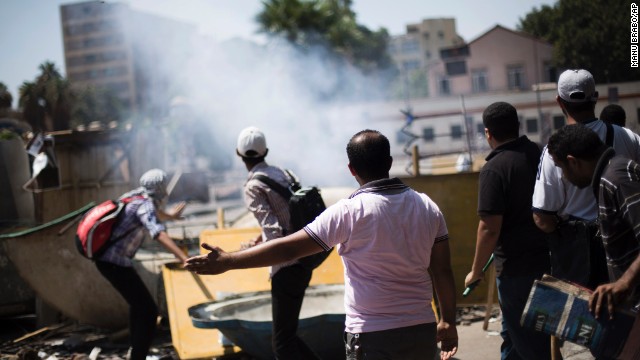 Morsy supporters react to an explosion during clashes with police officers on July 5 outside Cairo University in Giza.
Morsy supporters react to an explosion during clashes with police officers on July 5 outside Cairo University in Giza. 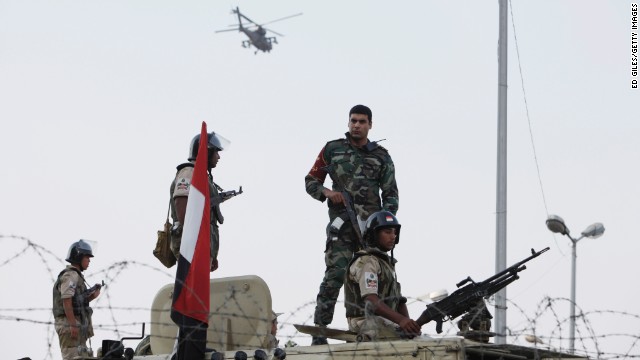 Egyptian Army soldiers stand guard at the Cairo headquarters of the Republican Guard on July 5 as an Apache attack helicopter flies overhead.
Egyptian Army soldiers stand guard at the Cairo headquarters of the Republican Guard on July 5 as an Apache attack helicopter flies overhead. 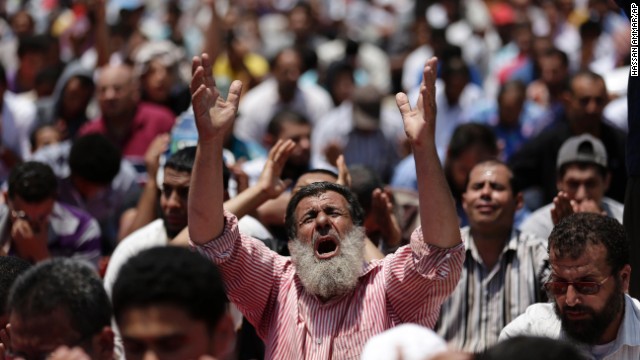 Morsy supporters pray near the University of Cairo in Giza on July 5.
Morsy supporters pray near the University of Cairo in Giza on July 5. 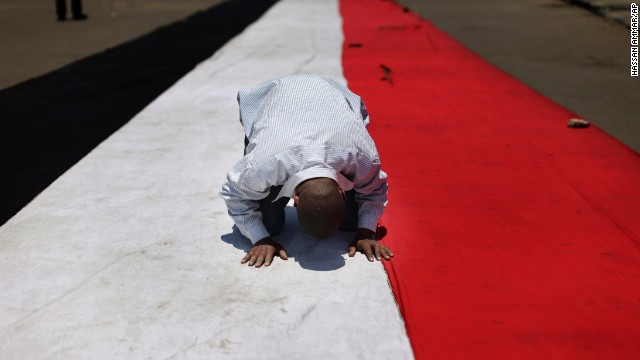 A man prays on July 5 before the protest near the University of Cairo.
A man prays on July 5 before the protest near the University of Cairo. 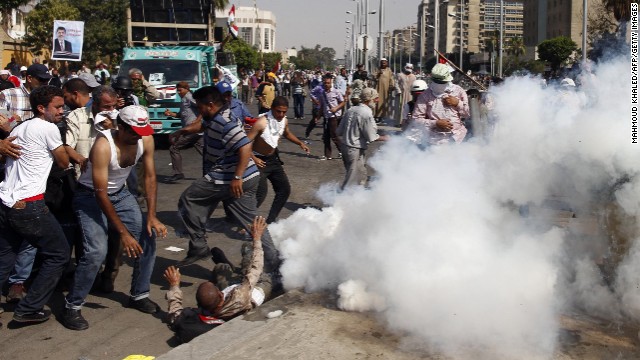 Protesters take cover from tear gas during clashes outside the headquarters of the Republican Guard in Cairo on July 5.
Protesters take cover from tear gas during clashes outside the headquarters of the Republican Guard in Cairo on July 5.  A military helicopter flies by Egypt's Presidential Palace in Cairo on July 5.
A military helicopter flies by Egypt's Presidential Palace in Cairo on July 5. 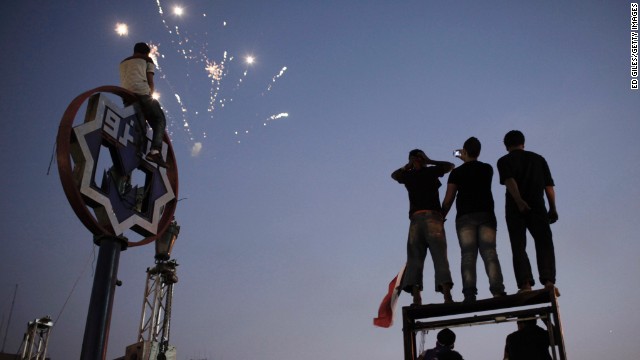 Egyptians watch fireworks in Tahrir Square on Thursday, July 4, the day after Morsy's ouster.
Egyptians watch fireworks in Tahrir Square on Thursday, July 4, the day after Morsy's ouster. 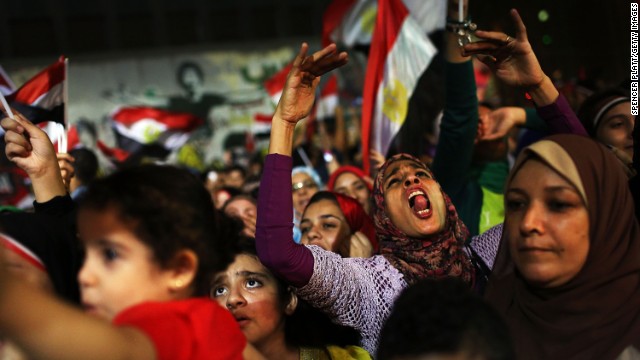 People dance and cheer in the streets of Cairo on July 4.
People dance and cheer in the streets of Cairo on July 4. 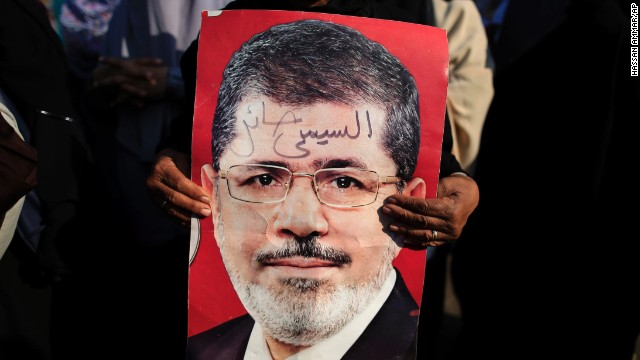 A Morsy supporter holds a poster of the deposed president during a July 4 rally in Nasr City.
A Morsy supporter holds a poster of the deposed president during a July 4 rally in Nasr City. 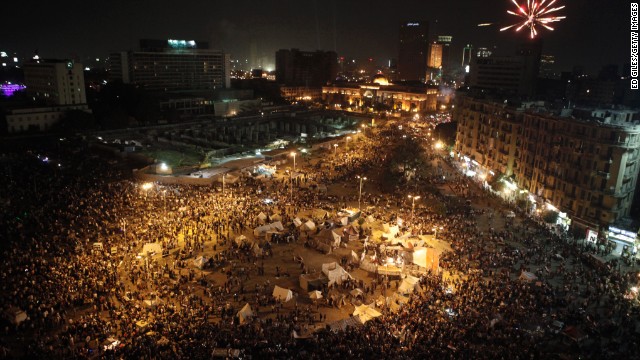 A massive crowd gathers in Tahrir Square on July 4.
A massive crowd gathers in Tahrir Square on July 4. 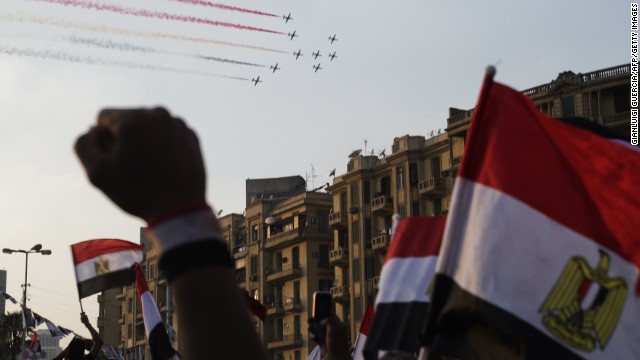 Egyptians cheer and wave national flags as airplanes fly above Tahrir Square on July 4, leaving a trail of smoke in the colors of the national flag.
Egyptians cheer and wave national flags as airplanes fly above Tahrir Square on July 4, leaving a trail of smoke in the colors of the national flag. 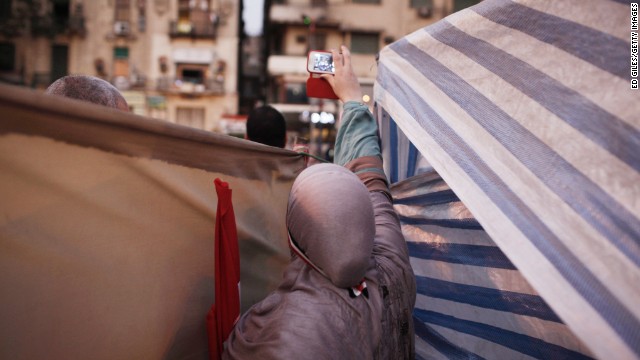 A woman uses a mobile phone to record the July 4 celebrations in Tahrir Square.
A woman uses a mobile phone to record the July 4 celebrations in Tahrir Square. 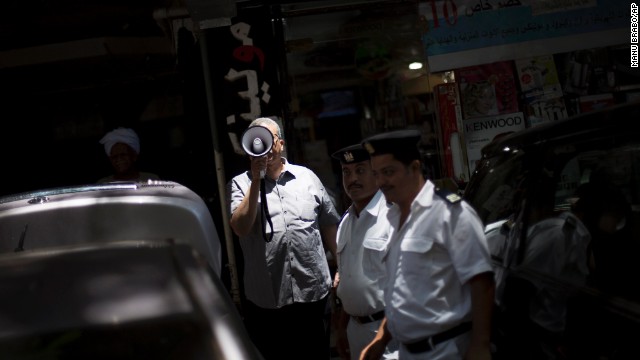 An opposition protester chants slogans against Morsy near Cairo University, where Muslim Brotherhood supporters gathered on July 4 to show support for the ousted president.
An opposition protester chants slogans against Morsy near Cairo University, where Muslim Brotherhood supporters gathered on July 4 to show support for the ousted president. 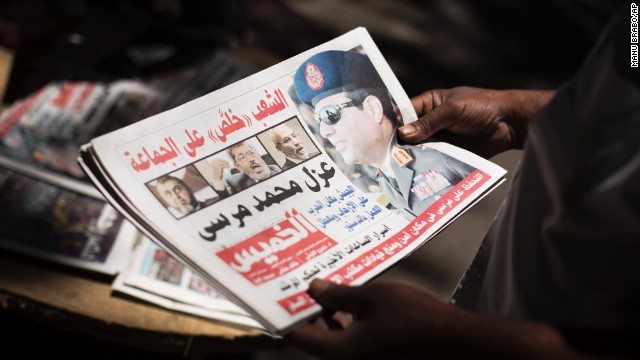 A man holds a newspaper near Mesaha Square in Cairo on July 4.
A man holds a newspaper near Mesaha Square in Cairo on July 4. 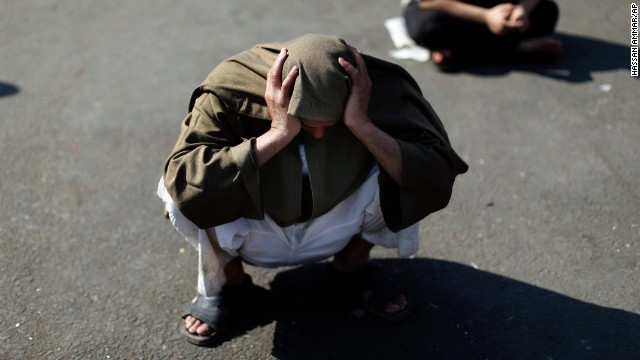 Dejected Morsy supporters attend a rally in Nasr City on July 4.
Dejected Morsy supporters attend a rally in Nasr City on July 4. 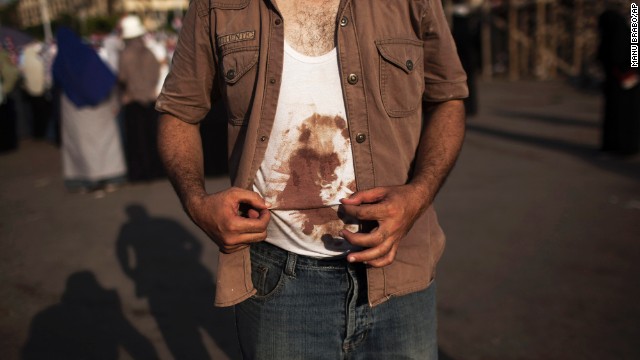 A Morsy supporter shows his bloodied shirt during a July 4 rally near the University of Cairo.
A Morsy supporter shows his bloodied shirt during a July 4 rally near the University of Cairo. 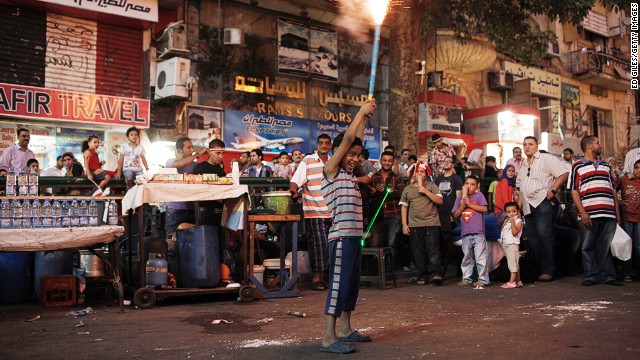 A young Egyptian boy shoots off fireworks during celebrations in Tahrir Square on July 4.
A young Egyptian boy shoots off fireworks during celebrations in Tahrir Square on July 4. 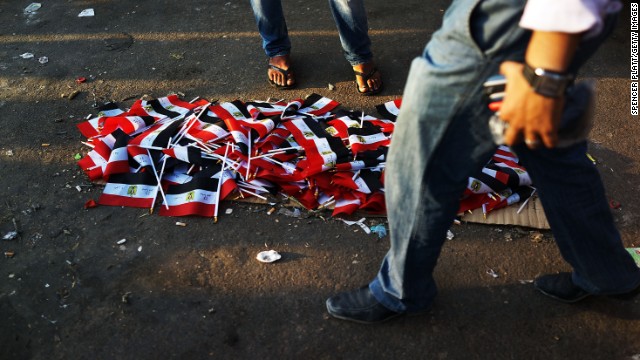 People walk by a pile of Egyptian flags for sale in Tahrir Square on July 4.
People walk by a pile of Egyptian flags for sale in Tahrir Square on July 4. 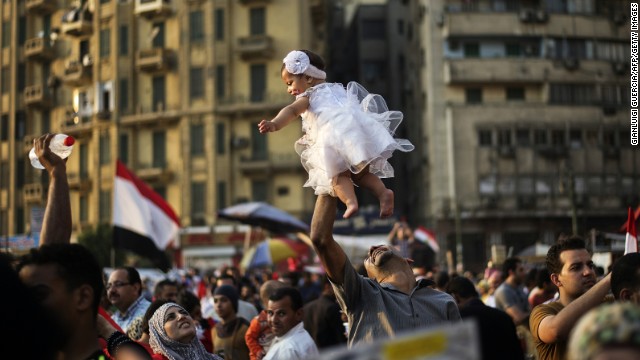 Crowds throng Tahrir Square on July 4.
Crowds throng Tahrir Square on July 4. 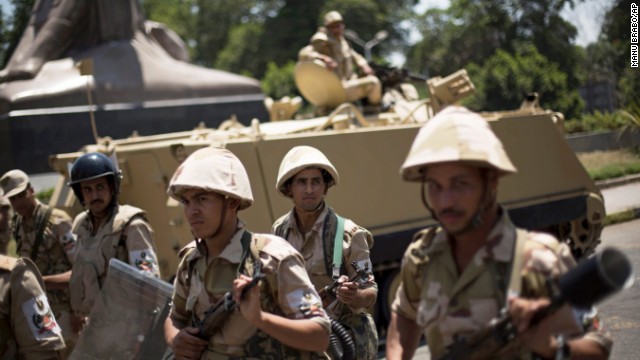 Egyptian soldiers deploy near Cairo University on July 4.
Egyptian soldiers deploy near Cairo University on July 4. 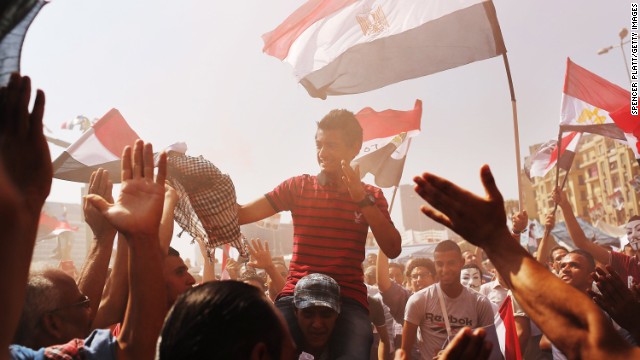 People dance and cheer at Tahrir Square in Cairo on July 4.
People dance and cheer at Tahrir Square in Cairo on July 4. 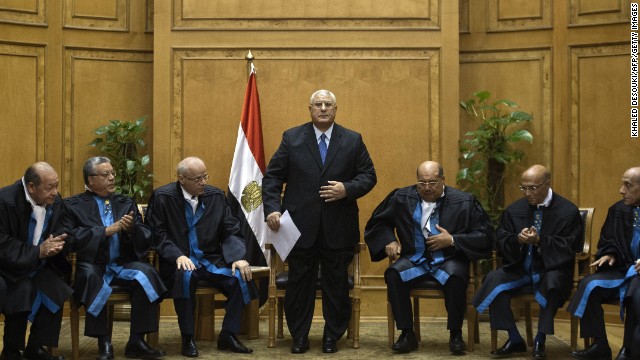 Adly Mansour, center, stands after delivering a speech during his swearing-in ceremony as Egypt's interim president in the Supreme Constitutional Court in Cairo on July 4. Mansour has served as the head of the country's Supreme Constitutional Court.
Adly Mansour, center, stands after delivering a speech during his swearing-in ceremony as Egypt's interim president in the Supreme Constitutional Court in Cairo on July 4. Mansour has served as the head of the country's Supreme Constitutional Court. 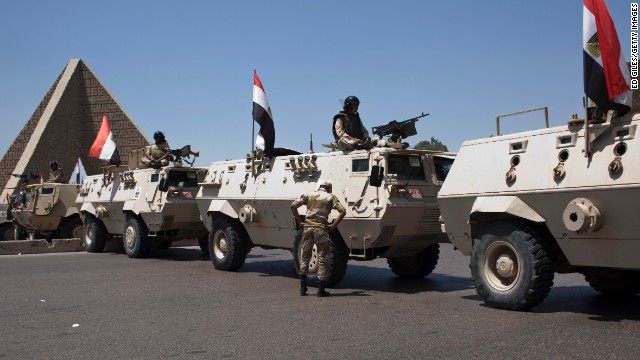 Armored vehicles with the Egyptian army sit at a checkpoint in the Cairo district of Nasr City on July 4.
Armored vehicles with the Egyptian army sit at a checkpoint in the Cairo district of Nasr City on July 4. 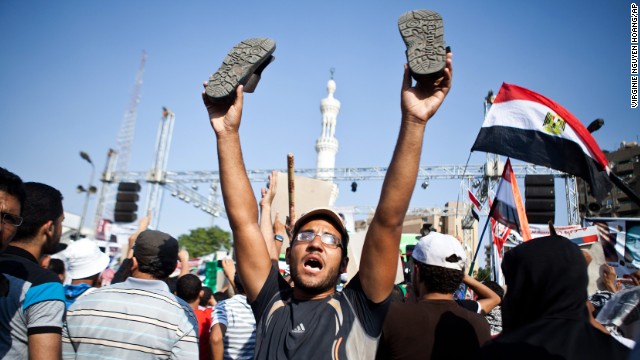 A Morsy supporter reacts as a military helicopter flies over during a July 4 rally in Nasr City.
A Morsy supporter reacts as a military helicopter flies over during a July 4 rally in Nasr City. 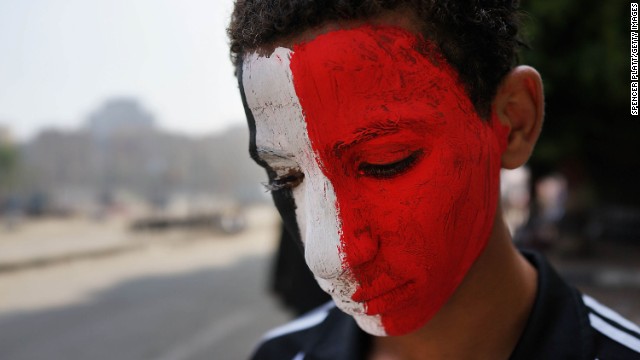 A boy with face paint the color of the Egyptian flag pauses on July 4 in Tahrir Square.
A boy with face paint the color of the Egyptian flag pauses on July 4 in Tahrir Square.  A pedestrian shakes hands with a member of the military at a roadblock in Giza.
A pedestrian shakes hands with a member of the military at a roadblock in Giza. 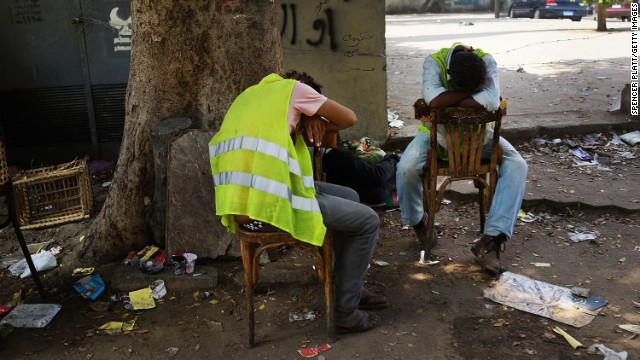 Security personnel rest on July 4 in Tahrir Square.
Security personnel rest on July 4 in Tahrir Square. 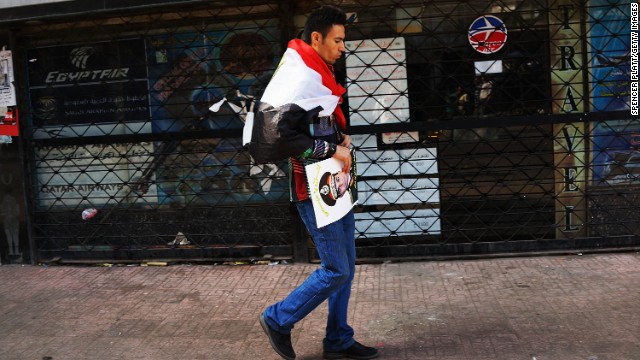 A man walks to Tahrir Square on July 4.
A man walks to Tahrir Square on July 4. 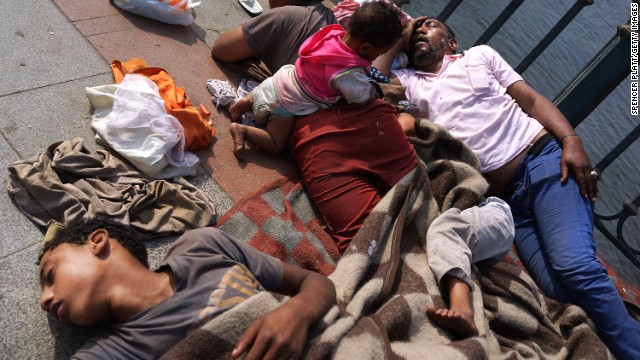 A family sleeps on a bridge near Tahrir Square on July 4.
A family sleeps on a bridge near Tahrir Square on July 4. 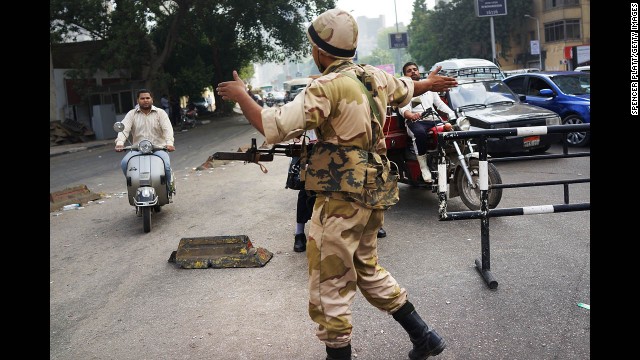 A member of the Egyptian military redirects traffic on July 4 at a roadblock in Giza.
A member of the Egyptian military redirects traffic on July 4 at a roadblock in Giza. 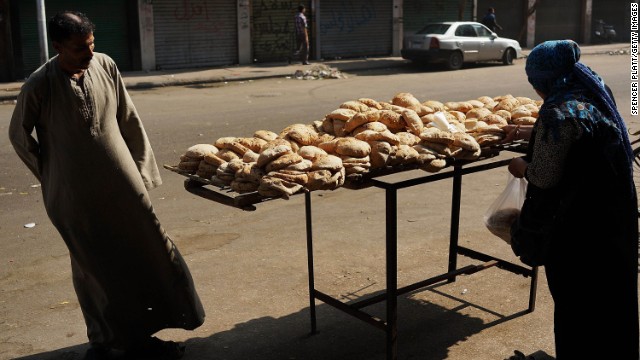 Bread is sold near Tahrir Square on July 4.
Bread is sold near Tahrir Square on July 4. 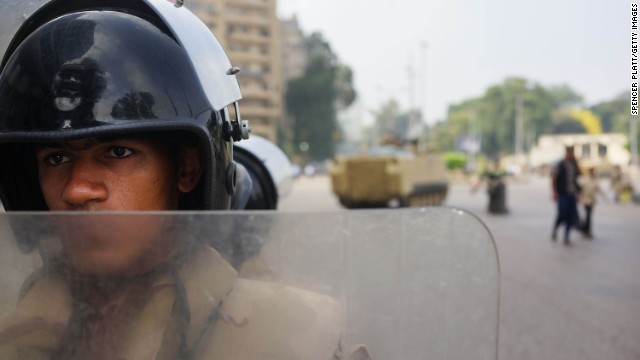 An Egyptian military member guards a roadblock in Giza on July 4.
An Egyptian military member guards a roadblock in Giza on July 4. 
1

2

3

4

5

6

7

8

9

10

11

12

13

14

15

16

17

18

19

20

21

22

23

24

25

26

27

28

29

30

31

32

33

34

35

36

37

38

39

40

41

42

43

44

45

46

47

48

49

50

51

52

53

54

55

56

57

58

59

60

61

62

63

64

65

66

67

68

69

70

71

72

73

74

75

76

77
- Ed Husain: Many Egyptian protesters believe Morsy is the legitimate president
- He says Morsy's son hinted his dad should step down, thus quelling unrest
- Husain says Morsy stepping down would give Brotherhood face-saving exit
- Husain: Brotherhood must be recognized; if Morsy goes, Egypt can move forward
Editor's note: Ed Husain is a senior fellow for Middle Eastern studies at the Council on Foreign Relations. The author of "The Islamist" can be followed on Twitter via @Ed_Husain.
(CNN) -- For the large numbers of Egyptians protesting in the heat while starving during the Ramadan month of fasting, Mohamed Morsy is the legitimate president of Egypt. And the violent and deadly clashes between security forces and protesters in Cairo will continue and many more lives will be lost unless we recognize and address this basic grievance.
The protesters are being led by the Muslim Brotherhood. They will not abandon mass street protests, their "comfort zone" as they have said. Thousands have been injured in the past three weeks and almost a 100 people killed. Egypt's economy will continue to tank, and political instability will haunt this ancient land. So what to do?
The clue came from Morsy's son, Osama Morsy, when he was interviewed by CNN.
Osama has rallied his father's supporters through public speeches. He knows the mood at the Rabaa El-Adawiyah rally and elsewhere in Egypt. He confirmed the standard views of the Muslim Brotherhood and others who oppose the recent military coup. But then he hinted at something: "Dad, you are the legitimate leader, you are the elected leader and elected president. We back any decision you take, even if you decided to leave the office."
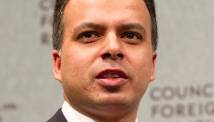
This might seem odd to outside observers and anti-Morsy Egyptians, but to the Muslim Brotherhood, the country's most-organized political force, Morsy is still the president of Egypt.
They still believe Morsy is in office, and unless he resigns, the protesters will not waver in their support for him. Security forces opening fire on the protesters or the military clearing the various public squares across Egypt only makes martyrs of the Muslim Brotherhood. The only way out of this impasse is for Morsy to resign from office to save Egypt from further instability and loss of life.
If Morsy were to officially resign, the Brotherhood would no longer need to rally around an individual, one of their own, who has been humiliated and mistreated. Morsy's resignation also provides the Muslim Brotherhood with a face-saving exit from its entrenched position of "Morsy is to be reinstated" during their protests. If Morsy were willing to leave office, it would also illustrate to Egyptians his desire to present further loss of life, return Egypt to civility, end the country's national disunity and allow the Brotherhood to return to the political process through elections rather than disruptive protests.
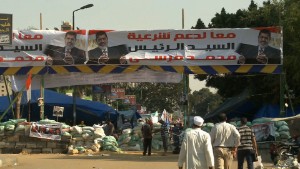 Pro-Morsy camp digs in
Pro-Morsy camp digs in 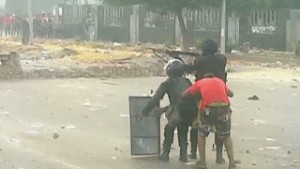 Egyptians fear more bloodshed to come
Egyptians fear more bloodshed to come 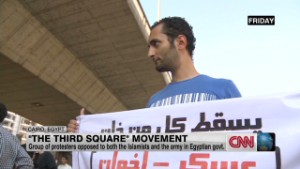 Egypt's 'third square' movement
Egypt's 'third square' movement If the past five Egyptian elections are a guide, then the Muslim Brotherhood will most likely dominate future parliamentary contests.
By resigning, Morsy would strengthen the Muslim Brotherhood. Ending the emerging culture of street violence would help to discredit the military's claim that the Muslim Brotherhood is turning violent and therefore should be banned, a move that would spell disaster for Islamist political activists and fuel radicalism in the country.
In sum, the parallel universe in which the Muslim Brotherhood's leadership and supporters exist needs to be recognized. Catherine Ashton, foreign policy chief of the European Union, has sought to be of help to Egypt, but she has not offered much leadership or vision. Egyptians do not need more news conferences and hurrying through meetings to catch a flight (as Ashton did).
Cooler heads within the Muslim Brotherhood must prevail in persuading Morsy to resign. Ashton and others can be helpful in negotiating their access to Morsy.
Egyptian politics will not evolve from mass protests. Yes, Morsy deserved more time in office to rectify his errors. And yes, the coup was a tragic error. And yes, Egypt's political opposition is a shambles, the local media deeply biased, the judiciary corrupt and the military politicized.
The Muslim Brotherhood's task is not to uphold Morsy but to renew and reform Egypt's politics and economy by learning from Turkey's success. To do that, Morsy can help Egypt and the Muslim Brotherhood move forward by submitting his official resignation urgently.
Follow CNN Opinion on Twitter.
Join the conversation on Facebook.
The opinions expressed in this commentary are solely those of Ed Husain.